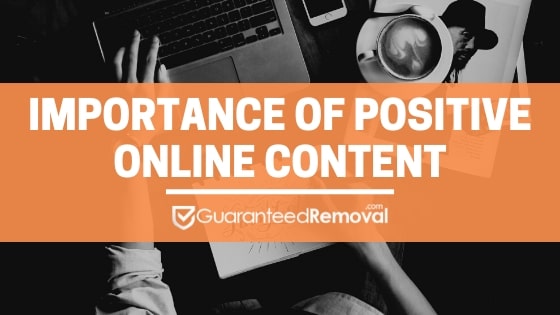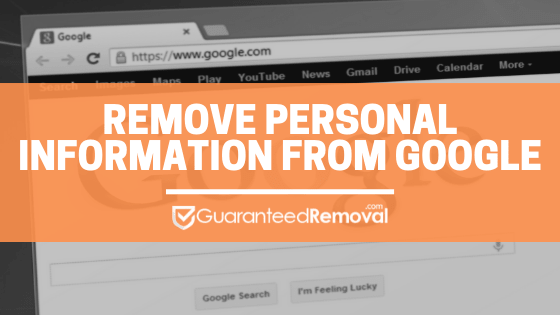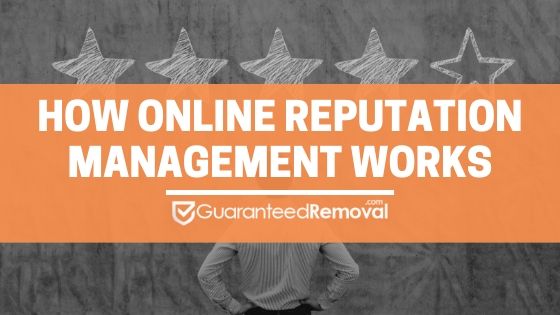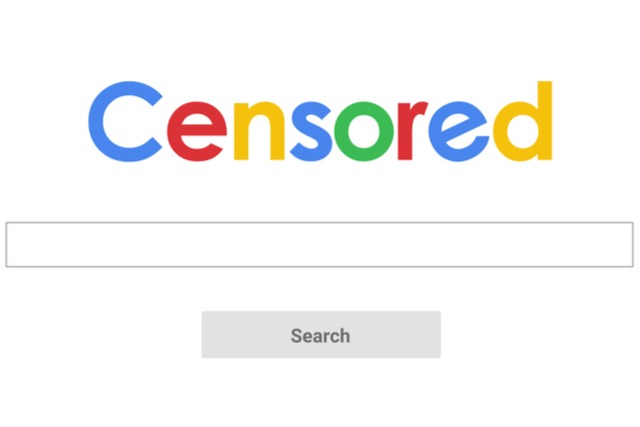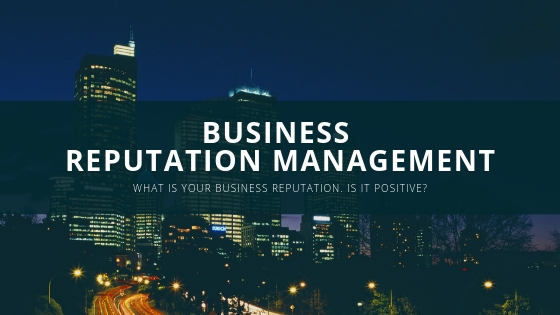How Can I Find My Mugshot? It’s Easier than You Think
If you’ve ever asked yourself, “How can I find my mugshot online?”, you’ve come to the right place. Learn how to find mugshots online with our step-by-step guide.
If you’ve ever been arrested, you may be shocked to learn that detailed information about your personal life has ended up on private websites — specifically, your arrest records, criminal records, and mugshots. The last thing anyone wants is for their criminal history to pop up during a quick internet search of their name. Luckily, there are ways to remove these damaging images from the internet.
Read on to learn why this started, and how to turn your prominent mugshots into a problem of the past.
Public Misconception
Some argue that posting mugshots online is in the interest of public safety. The immediate misconception when seeing mugshots online is the assumption of guilt — but it’s important to remember that an arrest doesn’t indicate that a crime was ever committed. A person arrested could have had their charges dropped, or may have never been convicted of a crime. Yet the arrested person could still have their reputation damaged by misleading information on the internet, from celebrity mugshots to inaccurate criminal records.
Ultimately, the removal of these images can help protect law-abiding citizens. In today’s world, many job recruiters, potential landlords, or even romantic partners often seek information online. Even just one mugshot stemming from a years-old arrest can spread like wildfire across websites and social media, falsely damaging someone’s real-life prospects.

Is My Mugshot Online?
It can be daunting for the average citizen to figure out how to find mugshots online to begin with. If you’re worried that any previous arrest records are accessible online, try the following:
- A quick search of your name in Google or another search engine (you can also check the “Images” section of search engines).
- Check well-known sites like FindMugshots.com and PrisonHandbook.com.
- Use the inmate search tool on your state’s department of corrections website.
- Check your state’s sex offender registry.
- Check the websites of your local police departments and sheriff’s office.
- Download the app JailBase and search for your arrest record.
How Did They Get My Mugshot?
Most often, bots pull these public images from a federal or state corrections website, such as a corrections inmate locator tool. Even some police or law enforcement agency release mugshots online when posting about crimes, though some states have recently begun to outlaw this. Essentially, any of the tools recommended in the list above could be used to pull your mugshot or arrest record without your consent. These databases are often updated every 24 hours, and as soon as an image appears, it can spread.
In most states, it’s up to law enforcement agencies to decide whether to release mugshots — which they often do. Occasionally they may withhold mugshots during ongoing investigations, and there are some states with stronger laws governing who can access criminal records. For instance, California recently passed a law forbidding law enforcement agencies from posting mugshots of someone accused of nonviolent crime on social media.
Juvenile records are usually withheld from the public, but in rare cases, juvenile mugshots are released if they commit a serious crime that leads them to be charged as adults. And there are strict laws regarding the dissemination of information related to sex offenders. Depending on the severity of the crime, it might be required for a perpetrator’s mugshot to be stored in an online database.
Mugshots As “News”
These mugshot sites aggregate millions of images under the guise of “news,” but can damage personal reputations in the process. There are several reasons that they classify themselves as news:
- Most search engines give news articles a higher ranking regardless of the veracity of the information, meaning your mugshot could be pushed higher up on the search results.
- This allows many websites to continue their practice of publishing mugshots online. By declaring themselves as news organizations, they become more immune to legal action.
Again, while many of these sites argue they’re providing a newsworthy public service, they’re ultimately just damaging reputations without repercussions.
The Legality of Public Mugshots
As mentioned, in many states mugshot records and other arrest records are legally part of the public record. Unfortunately, in most cases, this means they can be posted online without a private citizen’s permission. This is partly due to the Freedom of Information Act (FOIA), which, starting in 1967, made everything from marriage certificates to death certificates part of the public domain. In 1996, an amendment to the act made it even easier to access this type of information electronically.
Now, the criminal justice system is fractured across state and federal lines, making it difficult to have standardized laws regarding how websites upload and remove damaging personal information. Ultimately, this leaves individuals on their own when it comes to facing mugshot extortion.

Where to Start
Ready to learn how to find my mugshot in the digital environment? Let’s get started.
Once you’ve determined that your booking photos or other vital records have been made public, it can be overwhelming to figure out how to begin erasing your criminal record. There are numerous options:
- Working with a third-party company such as online reputational management (ORM) firm to facilitate the removal of mugshot online
- Reaching out to the website(s) directly
- Posting more information of your own to try to lower the chance of the mugshot being seen online (this can be time-consuming if you are busy to be writing articles, press releases, blogs, etc.)
- Attempting to get your conviction expunged
What’s Best for Me?
Of these options, many recommend working directly with an online reputation management (ORM) company to begin the removal process. Although an individual can reach out directly to a search engine or a website to remove information, they will likely have little success if the information is publicly available. You can also work with law enforcement agencies to expunge your record if there is a minor offense to clear — but this is an arduous process that usually requires filing a petition in court. And posting more of your own information (on social media or websites) can lower the chances of your mugshot or other sensitive information being discovered, but won’t actually delete the content from the Internet.
ORMs generally have experienced staff and bespoke technology that allow them to quickly find mugshots and criminal records faster than a simple internet search could. If previous methods fail, paying an ORM ensures that past mistakes or misunderstandings are permanently erased, not just buried in the search results.
Working with an ORM
Working with an established company to remove one’s mugshot online gives you the benefit of legal expertise, a proven track record, and guaranteed results. ORMs such as Guaranteed Removals also only charge clients once content is fully removed, and ensure that, once removed, any harmful online content is gone for life. From criminal records to mugshots, an ORM will ensure that your arrest record will no longer have an impact on your public life.
It can be daunting to begin a mugshot search on one’s own, since there are so many potential websites to sift through. An ORM will handle every possible mugshot online as well as future postings that could affect your reputation.

How Else Can an ORM Help Me?
An online reputation management company can do much more than erase arrest records and mugshot records. They can also enhance the online reputation of businesses and individuals, and remove likewise damaging content, including personal information that could risk your privacy.
An ORM can also focus on producing positive content, including writing articles in your area of expertise to establish you and your firm as a thought leader in your industry niche. Your website, including the About Us and bio section, will be optimized for search and page ranking. Your LinkedIn bio will also be updated. Regular blog articles optimized for search will be created so that fresh, new, and positive content is continually generated. Google loves great, relevant content.
ORMs go beyond simply posting on your behalf. They can use high-level strategies to change the Google algorithm and rank your business higher up in search engine results. This can give your company a leg up against the competition when it comes to web traffic.
The Bottom Line
If you’re looking to permanently delete any public records — from juvenile records to death certificates to marriage certificates to mug shots — from the Internet, working with an ORM can singlehandedly address all of your needs. It may seem daunting to try and even begin the mugshot search, let alone deletion, but clearing one’s evidence of criminal history online can positively impact your future, whether it’s in the job market or your personal life. There are proven resources to help, and state laws are slowly developing to address the overall issue as well.
If you’ve been wondering how to get your personal information off the web once and for all, GuaranteedRemoval can help. Contact our team today by dialing 941-304-5206 to learn more or to receive a free removal analysis.
What to Do If Someone Has Your Phone Number and Why It Matters
A scammer can use your phone number to harass you and your close ones and steal valuable data and sensitive information while impersonating you.
The huge progress of technology and the vastness of the Internet has brought many things, both good and bad. And somewhere in between people found a way to use someone else’s phone number and get away with it unnoticed.
And with all the breaches that have happened lately, there’s a possibility that you may fall a victim to phone spoofing scam.
Can someone steal my phone number?
Most definitely, yes! Your mobile phone number is present throughout the Internet, and it’s prone to being an easy target for scammers to try and hijack it and gain access to all your data, social media accounts logins, apps logins, and text messages, etc.
There are plenty of ways your mobile phone number and your privacy may be compromised and used for malicious intent:
Data mining
The simplest form for scammers to use your mobile phone number is by putting it through people search sites – where in a swift method the scammers can acquire enough information about you. All those search sites sell your personal information to hackers and scammers.
What’s scary is that there’s plenty of data they can find about you just from putting your mobile phone number through a people search site.
Your address, criminal records, and close relatives’ names among other things are at their disposal to be used by the scammers to blackmail you, hack your social media accounts, and even commit identity theft.
Phone spoofing
To put it simply, phone spoofing is when a scammer makes your phone number appear on a recipient’s caller id when you didn’t even make the call. Essentially, phone spoofing is used to hide the real identity.
And there are plenty of reasons why it’s done so frequently:
- Access to valuable pieces of information: A standard method used by private investigators and collection agencies to lower the risk of being detected while gathering sensitive data through spoofing.
- Business purposes: Plenty of businesses spoof real local phone numbers to mask their identity to protect buyers’ and sellers’ phone numbers, and to prevent transactions from happening outside their platform. Each of them gets a number that can be temporarily used for calls, and once the period expires the spoofed numbers are reassigned to other parties.
- Commit fraud: This goes without saying. Phone spoofing is used to persuade and scam potential victims to make big purchases or to provide plenty of valuable information that may be used to access bank accounts which results in the victim losing his money.
SIM swapping
A sim swap scam is a danger that lurks frequently and the things that can be done with sim swapping can cause some serious trouble.
A scammer usually searches for a weak spot in two-factor authentication and two-step verification. Also, he will use social engineering techniques to exploit the service provider to port the victims’ mobile phone numbers to the fraudster’s SIM card.
Once the sim swapping has occurred, the scammer will now receive any text messages and voice calls that were intended for the victim.
And because he now has the number, he could easily bypass the two-factor authentication methods and gain access to any account that is tied with the number, from your contact list, your address, and area code up to your financial accounts, social media accounts, etc.
This will leave an open space for him to either transfer money from the victim’s bank account, extort him, or to sell his data on the black market on the deep web which can be used for identity theft.
Things go further down the line. You may not even be able to get your cell phone number back once the scammer managed to fully convince the telecom service provider.
How to protect yourself from phone spoofing?
Now that we’ve made it clear that your phone number can be spoofed, we’ve compiled practical ways to deal with this potentially serious issue:
Change your number, get a new SIM card
The first logical thing to do is to change your phone number.
Yeah, it may be a hassle to get a new SIM and retrieve all the contacts that you’ve accumulated throughout the years, but changing your phone number sometimes may be the only option
Contact your telecom provider and change your phone number as soon as possible.
Leave a voicemail message
To let your contacts know that you’re a victim of phone spoofing, leave a voicemail answering message that says your phone number has been spoofed and that they should not engage with the caller.
Make sure you also tell them to block the number so that it will lose the value for being utilized by being blocked numerous times.
File a report to the FCC
If you are sure that someone is using your cell phone number, filing a complaint to the Federal Communications Commission (FCC) may be the best option to sort this issue out.
Just go to their website and fill in all the information needed or call their hotline.
Protect your privacy
Discretion is advised. Do not put your phone number on your public profile or any online account.
Update your information on all accounts, and use different usernames and passwords on all online accounts for extra security.
Additionally, check your credit card bills, phone bills, and bank statements. If something seems odd, report immediately to the financial institutions and let their work professionals check for everything.
Bottom Line
The best way to not fall a victim to spoofing is early prevention.
And even then there’s still a chance that a scammer will find a way to use your phone number to commit a crime or to scam other cell phones.
If the worst happens, freeze everything! Freeze your cell phone number, and your bank accounts and contact all the service providers that can help you sort the problems out.
Additionally, keep track of all the call logs and messages you’ve done so that you can protect yourself from being held responsible for any potentially illegal activities committed by phone calls using your number.
Take all these things into consideration and apply every step for much-needed security.
Frequently Asked Questions
- Is caller ID phone spoofing legal?
According to the United States Truth Caller ID Act of 2009, phone spoofing is allowed but it’s considered illegal when a person ” knowingly transmitting misleading or inaccurate caller identification information with the intent to defraud, cause harm, or wrongfully obtain anything of value”. And if there’s plenty of evidence that states they have violated this act, their actions are considered illegal and they will face a penalty. - How do I know if callers are using spoofed Caller ID?
To quickly identify if the caller is using a spoofed Caller ID, dial the number that appears on your display. The cell phone number may be busy or give you an inactive message and you even may get a person to answer your calls to tell you that they didn’t make an attempt to call your cell phone number.
If you’ve been wondering what to do if someone has your phone number, GuaranteedRemoval can help. Contact our team today by dialing 833-873-0360 to learn more or to receive a free removal analysis.
How to Find Out If My Information is on the Dark Web: Your 2022 Guide
Wondering how to find out if my information is on the dark web? With our guide, we help you locate your details and remove them, protecting your online privacy.
There are vast possibilities for people that are into the dark side of internet usage – the Dark Web itself. For people that are trading and selling data, this is a place where they can do that freely.
Criminals use a plethora of hacking forums and websites where they are trying to learn the black trades of the internet and trade or buy credit card accounts, personal information, bank statements, social security numbers, and many more sensitive data.
When it comes to getting your own details, internet criminals are trying to collect your data from various phishing scams and data breaches. There are way too many options for them to trick you and press you to share your personal data, not knowing that you are a victim of a fraudulent activity
Every user on the internet should be careful and not share bank accounts, financial information, and credit card numbers and avoid saving passwords on Google Chrome. This stolen personal information has its own price on the web and these cybercriminals are trying to benefit from it.
To get a better grasp of what is the dark web, internet gurus separated the internet into three layers:
- Surface Web
This is the web that all people are using and everybody is already acknowledged of. This is where everything legally is happening and most websites are hosted. Social media platforms, news outlet websites, e-commerce, and all the variations of the websites we know are here and this is the safest place on the internet when in comparison to the other two layers. - Deep Web
The deep web hosts the sites that are invisible to the casual user and this is where most of the websites that require invitation or login are hosted. Many confidential data details like photos and videos that are in possession of certain websites are hidden on the deep web. This is considered the middle layer of the net and this is where bank statements, credit reports, and social security administration are hidden. - Dark Web
This is the area that falls under the deep web and it is only accessible with special browsers and authorization. All the content that is shared and hosted on the dark web is not indexed and cannot be found with the regular search engines. This is the place where illegal stuff is going on and where you can set up a private network, called a darknet.
But how does everything work? How these people are actually getting and selling our data? Stay with us and understand how the dark web works and how can all of us be exposed to such scams and identity theft cases.
How does the dark web work?
The dark web is the space of the internet that is not easily accessible. This is where most of the illegal stuff is happening and you will need to use a specific browser to surf this area of the internet. Once you enter the dark web, you will need to know how to navigate it and locate what you are after.
To protect its users, the dark web browsers are using many layers of encryption and are providing the customers with very high anonymity – suitable for trading or selling forbidden products and services.
To access the dark web, you will need to use the Tor browser which actually is one of the largest browsers for such use and most people are going with this one when they access this side of the internet.
Tor ( The Onion Router) redirects the data via multiple encrypted layers and it helps to lose track of the actual location. Most of the websites where you will be able to find your misused data end with the extension .onion
When it comes to using the Tor browser, everybody can use it and access the dark web, since it is free and you can download it on your computer. The thing is that the US government and the state department are behind this browser, making it legal to be used by everyone.
To summarize the usage of the dark web, we can freely say that there are only several legit businesses and companies that are using it and aside from that it is mostly used for any unusual activity – mostly criminal.
How do dark web scans work?
Scanning dark web sites is not a simple process. This is called dark web monitoring and when companies that are hosting certain darknet are releasing a data breach or dumping data that goes public, this is an opportunity to stroll through this data and check if you can find something useful.
The term data dump refers to releasing usernames and passwords to certain webs that require login on all three layers of the internet. Besides the credentials, there are also dumps from credit bureaus, online health records, medical records, driver’s licenses, and social security numbers that various identity thieves gathered all around.
Once these details are used, they are dumped and when no longer needed can be posted on the dark forums where are finally sold to any interested party. The dark web scan refers to checking these leaked details that are found on the dark web.
So if some tool or service provider is scanning the dark web on your request, in case they find your details, they will let you know that you’ve been found on any of those databases.
Do not be fooled that they will be able to scour the whole dark web. They are only checking the web lists that they are aware of and any public leaks they have access to. There is no possibility to scan the whole dark part of the internet.
What should I do if my info is on the dark web?
Before we continue with some steps that you can do in order to take action about your data found on the dark web, we want to suggest some guides to protect your data before the leak happens.
For starters, try to use some password manager service or tool that will protect your credentials from possible data breaches. If your data is secure, then you should not worry about unwanted exposure. Also, for additional protection, activate two-factor authentication on the login pages where this option is available.
The next point that you need to avoid is to connect to any public wi-fi networks. No matter if you are using Tor or any regular search engine like Google, you will have your details exposed. Since these networks are open, there is a possibility for a hacker to enter your device using the network – and if this happens, your data is available to them.
Unfortunately, besides contacting the dark webmasters and request removing your data from their websites, there is nothing much you can do if your details are already publicly available on the dark internet.
You will not be able to post fraud alerts or monitor the entire dark web. But do not fret, there are some additional steps you can take in order to prevent any potential misuse of your details. Here is what you can do:
- Place a credit freeze in order to avoid hackers opening credit in your name and misusing your bank account.
- Obtain free credit reports and check if there are any fraudulent charges. The credit report will show your status regularly since if you are a victim of identity theft, this might help you restore your credit standings. This is a free service that you can use if you find your data exposed.
- When it comes to suspicious activity on your social security number, you can create a mySocial Security account and claim your number with your name to avoid anyone else creating an account in your name. Also, you can report this to any Social Security office physically.
- In terms of protecting your account passwords, try to generate new passwords and have a habit of changing passwords regularly. Have secure email accounts that you are going to use as backup emails to recover passwords.
- If you locate your driver’s license details on the dark web, the one thing that you can do is to report that to the Department of Motor Vehicles with the details that your license is compromised.
- A passport number can also are traded online. Report this to the closest police station, no matter the country you are residing in.
To be truthful, sensitive information is traded online daily, and many other online accounts suffer from identity data theft. The entire dark web is full of such details and this is the place where online privacy is damaged the most.
The world wide web and the normal web browsers are in focus for attack since they have the most users with minimal experience, being careless with using their credit card number and sharing sensitive info. If you do this, you are exposing yourself to being attacked and having your data traded or sold.
Need more help with getting your information off the web? Click here to contact us now!
Getting Spam Calls from Sierra Leone? Here’s What to Do
Getting spam calls from Sierra Leone? Learn how to fight back with our comprehensive guide.
The Internet is a place full of scammers who are using every chance to get to your hard-earned money. One of the latest scams is the phone calls that are coming from Sierra Leone and in some cases from Mauritania as well.
This kind of spam call became very common recently and people (especially elders) need to be informed about what to do in these situations before they make outgoing international calls without knowing. The scams became so famous and the most recent scam with calls coming from Sierra Leone was called the “Wangiri” scam or better known as “One Ring Scam” where scammers collect money from return calls which can add some big numbers on your phone bill.
In this article, you will be able to find more information about Phone scam calls and also some suggestions on how to protect yourself in these situations.
Why do I get calls from Sierra Leone?
If you are getting a call from Sierra Leone and you don’t have any relatives there, then you are part of the “One Ring Scam” where the caller wants you to answer the phone or make a callback. Once you make a call back you will be charged long-distance fees and additionally some of the information that you may share can be used for identity theft.
More info about Sierra Leone Phone Scam
Many people will think that Sierra Leone is actually a name of a person but it is an African country and is involved in one of the biggest phone scams in recent years. There are thousands of people in the US who reported that are receiving calls from Sierra Leone and some caller identifications cannot recognize and are reading the number as a United States number.
There was a report from Federal Communications Commission that says scam robocalls aim at specific areas across the country and make calls to U.S. residents.
In the first scenario, they will call you and wait for you to answer so they can try to get some personal information or lead you to buy something you don’t really need.
In the second scenario, the callers are ringing only once or twice and they are hoping for you to call back. Once you call back you will get charges for long-distance calling and callers will try to keep you on the line as much as they can (so you can receive bigger charges on your phone invoice).
This scam is designed to make you call back because the charges for calling overseas, especially to this destination in Sierra Leone are pretty high. You will get charged $20 once you establish your connection and additionally you will get charged $9 per minute.
Those robocalls ring only once on your phone expecting to get your attention so you will call back and because of that, this method is called “One Ring Scam”.
Please keep in mind that numbers who are calling you from Sierra Leone (area code 232), Mauritania (area code 222), or Dominican Republic (area code 809) may appear on your caller ID as U.S. numbers that include area code and seven digits.
How can I stop spam calls from Sierra Leone?
In case you are getting an enormous number of calls from some of these countries, there are some steps that you can take in order to block and stop them. There are a few steps that you can take in order to get rid of those calls. Feel free to try some of them added below:
On Android phones:
- Go to “Recent Calls” on your phone.
- Long tap on the number that is bothering you and when the collapsing menu appears just select “Block contact”.
On iPhones:
- Phone > Recents and click on the info button which is next to the number that you want to block.
- Select “Block this caller” and then tap “Block Contact”.
On iOS 13:
- Activate the new iOS feature “Silence Unknown Caller”.
- Go to “Settings > Phone” and toggle the switch to activate “Silence Unknown Callers” this will protect you from scam callers.
Many scam caller robots are using dynamic numbers and because of that, this is not going to be a permanent solution.
Need help with removing your personal information online? Click here so we can help!
SWOT Analysis
This analysis will help you and your company undercover any issues when dealing with both internal and external strategies and ideas. Making sure you have a clear understanding of what a SWOT analysis is important. Please note “SWOT” is an acronym for Strengths, Weaknesses, Opportunities, and Threats. Let us break this down a little more for you.
— Pessimism leads to weakness, optimism to power —

Strengths:
These are the first key indicators you want to look out for, so grab a piece of paper and a pen. Write down everything that helps your company, inside and out. Any expertise on the topic you are providing clients with or maybe your website is designed at a higher degree making competitors appear obsolete. Maybe you have the lowest prices!. In addition, if you have a strong and productive work environment that could be considered a strength as well. Anything you feel makes your company better should be listed in this category. Focus on building trust.
Weaknesses:
Now it is time to make a list of the negatives or the opposing sides to your strengths list. As many hey experience a lack of resources and knowledge and this can be detrimental to the overall success or online reputation of your company. Having a poor customer experience is never the goal to make sure your employees go above and behind to ensure a client is happy, poor communication can be the end of you. Pay attention to what could possibly hurt you and start devising plans on how you can rectify this, otherwise known as “opportunities”.
Opportunities:
Once you have sat down and compiled a list of strengths and weaknesses it is now time to look at your opportunities. This is more of an external focus as you will come to learn. Creating a powerful networking system can assist in many ways. The generation of ads will increase your sites visitor volume and that shows Google and others that people are interested in the content you write about and/or what you provide. Other ways to look at opportunities include:
- Creating a new niches
- Leveraging a new product or service
Threats:
Lastly, it is now time to evaluate your potential threats (internal/external). Examples would be a competitor is outranking your website online or clients are starting to take interest in other sites over yours. Make sure you keep your information up-to-date, nobody wants to read outdated information. If you do this correctly, you can turn this into a strength quickly. Your threats should consist of all things that can and will harm your company.
Why should I use a SWOT Analysis?
As a business owner or blogger, you need to know what is affecting your website and how. A SWOT analysis is designed to better help you identify and understand key issues or benefits. This should not offer solutions but simply a list of influencing factors.
After you have completed your SWOT analysis you will have a better grasp of how you can better utilize your resources. Vice versa, you can also pinpoint useless issues you are currently spending time with and reallocate that effort to a more important threat or opportunity. You will start to see operations work smoother as you will be dealing with lesser risk once you have a generalized idea of where you stand amongst your competitors.
What to do After Performing an Analysis.
Once you have listed all of your components within your SWOT analysis it is time to sit down with your team and discuss solution possibilities. Begin by pointing out your strengths and how much power you actually have on the internet. Now take those positives and see what threat you can better improve upon. Going over your options on a monthly basis is a great start. During your performance meetings just go around the room asking everybody what they like or dislike. Taking care of your internal efforts has positive repercussions.
Call us today to see what options you have. One of our very knowledgeable advisors can design a plan perfect for you. Now it is time you know more about your company. Be in the know and act quickly.
How Often Should You Google Yourself in 2021
Google yourself: Have you ever searched for yourself on Google? Surprisingly, the vast majority of people in this country don’t do that often enough. That can be a problem because there is a big chance that the things you find when you look yourself up are surprising, and not in a good way.
The co-founder of BrandYourself.com struggled to find a job because he was showing up as a criminal with the same name on Google. If you create a strong online presence it is less likely you will pop up as the criminal who robbed a bank at the quick mart.

Google Searches May Negatively Effect Your Reputation
A recent study shows that of 1,000 adult Americans:
1. 24% of adults (43% of millennials) had experienced the negative effects of information about themselves on the internet.
2. 20% found information to be inaccurate.
3. 33% saw content that belonged to them had been spread without their permission.
4. 12% were unhappy about the information they found about themselves.
Even those who do not identify with any of the above statistics are likely to worry that they might one day. Indeed, more than 50% of all adults and more than 65% of all millennials worry that information that is placed on the internet about them could have a negative impact on their overall reputation. And they are right to think this way. Most of us, when we want to know something, will head to Google, whether that is to find information about a business or about an individual. The recent survey also showed that 42% of all adults (57% of millennials) changed their opinion about people because of the information they found online.
Google Searches Impact Those Applying for Work
The importance of Googling yourself cannot be stressed enough, as was recently mentioned by BestColleges.com, particularly for those looking for work.
“Checking up on applicants’ social media profiles is becoming routine for many employers and admissions offices around the country. Recruiters say social media helps them gain a more comprehensive picture of a candidate than a simple resume and cover letter. Depending on how they view what they find, an applicant’s web presence can make or break an offer. This is especially true for students or recent graduates lacking a detailed job history to support their application.”
The BestColleges.com research showed that:
1. 70% of employers turned down an application due to online information about them.
2. 84% of employers believe that online information will further drive decisions over the next five years.
Clearly, people need to Google themselves to allow them to control the narrative. Yet, very few people do. Indeed, the research showed that:
1. 60% of people never Google themselves.
2. 47% Google themselves, but no more than twice per year.
3. Just 7% have a Google alert on their own name.
4. Only 5% of people have invested in reputation management software.
To add, 77% of those who have experienced a negative impact as a result of information about them online now Google themselves regularly. However, this also means that they waited too long.
Experts agree that people should immediately perform the following steps:
1. Google yourself at least once a month.
2. Search for yourself on social media at least once a month.
3. Regularly check the court records.
4. Fix any mistakes that you find.
5. Create lots of positive information about yourself.
6. Set up Google alerts for your own name.
Contact us today if Google reveals troubling information.
For more information, here’s an 8-minute video that explains how to remove articles from the internet and Google.
How Your Background May Affect Renting in 2021
In this article, we explore how your background may affect renting. It is important to note that if you want to rent a property, it is likely that your landlord or the housing agency would want to conduct a background check on you. In many cases, the only check they will perform is a credit check, something they can do by law.
However, you do have to give permission for this check. Naturally, should you not give your permission, you probably won’t be able to enter into a tenancy agreement either. Exactly what landlords check during a tenant screening check will vary, however.
“What landlords check-in a rental screening varies. Some may check only your credit score. Others may require more information. These “tenant screening reports,” as they’re often called, frequently include various reports and details.”
Generally, landlords will look into your credit history, your criminal background, and your rental history. Out of those three, your rental history is generally the most important. This will tell the landlord whether you are likely to pay your rent on time, after all. Let us take a look at the implications the things they find will have on your ability to rent.

Your Ability to Rent and Your Background
The first thing to remember is that landlords cannot discriminate against you based on your background.
Some rental agencies might say not to apply if you have a criminal record. That could be discrimination. If you think that a landlord illegally discriminated against you for any reason, such as your race or gender, contact the Department of Housing and Urban Development.
You should also report this to the Federal Trade Commission, as they also have rules and regulations in place in terms of what a landlord can and cannot do because of what they find on a background check.
One of the biggest red flags for a landlord is to see a past eviction on your credit report. This will show up as part of the public record section. Whether or not the landlord is willing to hear your side of the story will depend entirely on them. Evictions stay on your record for seven years, so if you are looking at renting within that period, it is best to be upfront about it.
The best course of action to take if you have an eviction on your record is to be upfront and honest with your new would-be landlord. Explain the situation, and take responsibility for it if it was truly your wrongdoing. Also, explain how you’ve grown as a person since then.
Rental Agencies Search Google First
You should also be aware of the fact that tenant background checks are now becoming more extensive. Not only will a potential landlord check your credit, rental history, and criminal background, they may also look at your employment history. Again, this is why it is so important to have a clean background before they search.
You can also be proactive. Offer to pay the maximum allowable security deposit and to accept a trial lease of just three months before signing a 12-month lease, thereby demonstrating that you are a worthy tenant. In addition, if you do have negative marks on your credit, criminal, or rental history, then try to make your work history look as good as possible.
Your work history is a vital part of the background check. It shows the possible landlord or rental agency exactly how you handle the responsibilities of a job. It also reveals if you have a steady source of income. If you have been employed for years at a high salary, you may be able to overcome a lot of other negatives in your background. To learn about removing information from the internet visit: NetReputation.com
In general, that is how your background may affect renting. If your background causes a lot of problems, we recommend you contact a reputation management firm.
If your background is affecting your ability to rent, we suggest you speak with a professional removal team, like Guaranteed Removal, who’s able to guarantee a clean background.
Why Guaranteed Removal Works in 2021
fGuaranteed Removal works by deleting or suppressing your negative information from search engine results. Possibly the worst thing that can happen to a reputation is when a negative search result appears on the first page of Google.
It doesn’t matter whether that result is true or not, whether it is a blog or a review, or any other type of information. It is bad news, as it paints you in a negative light. And you need to do something about it. One of those things that you can do is make use of “guaranteed removal”. So what is that?
Understanding Guaranteed Removal
There are no such things as 100% guarantees when it comes to the internet. What can be done, however, is to find a privacy protection agency that guarantees their removals, but you have to understand exactly what it means.
“We can’t guarantee that we can delete every single negative review on the internet. Our guarantee is that we delete or de-index your negative reviews, or you don’t pay us. Before signing an agreement, we’ll outline the cost and time frame to remove your negative reviews.”

How to Deal with Negative Reviews
The reason why you should always opt for a Guaranteed Removal’s service is that, by and large, we work. Our team of expert reputation management specialists understand your situation and know it takes to get the job done right… the first time. We guarantee our service and will remove all negative items we find about you online. To learn more about Online Reputation Management visit: NetReputation.com
1. We target mugshot websites
Mugshot websites are under a lot of fire right now for only removing information for a hefty fee. This has led to numerous lawsuits against them, with people claiming it was a form of extortion. As a result, they are now willing to remove content on request, particularly because some states have issued laws requiring this.
“Lawmakers are working to shut down these websites and make it possible for citizens to file a lawsuit against them. Georgia state representative Roger Bruce introduced a new law that makes it a crime for websites to charge Georgia citizens to remove their mugshot.”
2. We submit a request to Google
Google has very stringent content and removal policies. If you can demonstrate that information is a breach of those policies, then you can request removal. Generally speaking, it is quite difficult to have something removed, so it is best to have a guaranteed removal service put in the request for you.
We apply this policy on a case-by-case basis. Note: Information on an official government website is off-limits to us.
3. We bury negative information about you
By far the most effective tactic to have information “removed” is by burying deep in the search results so nobody finds it. Indeed, this has been proven several times through independent research.
75% of Internet users never scroll past the first page of search results.
Most fail to go past the first page of Google. Any information on page 4 or beyond may as well not be there at all. A good reputation management firm uses strategies to make sure negative information is not on the first or second page of search engines.
Contact us today and discover why Guaranteed Removal works daily for thousands of the Americas.
Oops! We could not locate your form.
How To Remove Arrest Records From The Internet 2021
How To Remove Arrest Records From The Internet: Everyone has one. Surprised? So, how do you remove arrest records from the internet? First, let’s discuss what an arrest record is. An arrest record indicates whether a person has an arrest or not. Therefore, you have one too. A criminal record, meanwhile, reveals any convictions a person may have… fewer people fit into that category.
If you have an arrest, this is a matter for the public domain. This means that anybody can access that record, and they can do so online. There are different state laws in place that stipulate this.
“The general rule is that arrest records are public records. However, each state can determine whether they wish for such records to be readily available to the public. Even in states that consider arrest records to be public information, there may be exceptions to when such records will not be released to the public.”
Obviously, have a criminal record, in particular, can cause significant problems for you in terms of obtaining housing or loans. However, arrest records can do the same thing. Someone who sees a mugshot online is likely to draw certain conclusions, even if it was later found that you were not guilty. But even if you were found guilty, you should no longer have to suffer the consequences of past mistakes if you have paid your debt to society.

Finding Arrest Records
There are a lot of websites that enable people to search for mugshots. Usually, these websites show an individual’s name, date of birth, and other personal details, such as height and weight. Some of these websites are those of police departments. In fact, there are police departments that run mugshot of the day competitions!
“It is the mission of the Dothan Police Department to preserve the peace and public order while enhancing the quality of life in cooperation with all who share in the common interest of this wonderful city.”
By and large, however, mugshot websites are private businesses. Interestingly, they make their money not through the people searching for mugshots, but rather from those appearing on them. They can charge thousands of dollars to have those images removed. This has become such a problem that some states have now recognized this as a king of extortion and are trying to put laws in place to stop this.
“Arrest logs and the potential harm they can cause people years down the road – especially those found not guilty or whose charges were dismissed – is an issue that balances fairness with freedom of the press and public records.”
Removing Arrest Records
So what can you do if you have seen that your arrest records are online? There are, in fact, numerous options available to you. However, this starts with being realistic about the possibilities.
“Some arrests can never be cleared, including arrests for sex-related crimes and drivers license suspensions.”
Oops! We could not locate your form.
But there are things that can be done, including:
1. Seal your records. This means that the public can no longer access it. Keep in mind this does not remove or destroy it, however.
2. Expunge your records. This means that the state will actually remove the arrest from your record so that no one, not even the courts or government agencies, has access to it. Remove arrest records
Will Guaranteed Removal Delete My Arrest Records?
Numerous factors influence whether the state will seal or expunge your arrest records. It is important that you understand those factors so that you have a better idea of how likely you are to succeed. Factors include:
1. Your age at the time of the arrest. Fortunately, most juvenile records are automatically confidential.
2. The rules regarding sealing or expungement in your state.
3. Your current relationship with law enforcement. For instance, if you have any prior convictions or are currently going through a court case, it is likely that your request will be denied.
4. The offense that shows up on your arrest record. Unfortunately, sex-related crimes and license suspensions are difficult, if not impossible, to remove no matter where you are in the country. Furthermore, states like New Jersey will not expunge any type of traffic violation.
5. How old is your record? Usually, you have to wait at least five years before you are eligible.
Are you ready to remove an arrest record? Contact us today and build a brighter future.
Oops! We could not locate your form.
How to Get a Clean Background Report With Guaranteed Removal
A clean background matters. Your background is a personal matter. However, some of it may be found in the public domain, and not all of that is good. For instance, arrest records are a matter of public knowledge and anybody is able to look those up. An arrest record will show your personal details when you were arrested, and on what charge. It will also show your mugshot. What an arrest record doesn’t show, however, is what the outcome of the case was.
For instance, you may have been the victim of identity theft, or perhaps you were later acquitted. Either way, that is not the conclusion people will draw when they see your mugshots online, and this can be very damaging to your reputation, your career prospects, and many other areas of your life. Let’s take a look at 4 reasons to properly clean your background.
Oops! We could not locate your form.

1. You May Be Subjected to a Professional Background Check
There are many jobs in which passing a background check is a requirement. For instance, if you want to work with children or vulnerable adults, they will likely conduct a background check on you. Other employers will ask you to agree to a background check. And while you do have rights in terms of the decisions made based on that check, you will generally have to comply.
Employers check your background before hiring you, or before deciding whether you can keep your job. When they do, you have legal rights. The Federal Trade Commission (FTC) enforces a federal law that regulates background reports for employment, and the Equal Employment Opportunity Commission (EEOC) enforces federal laws against employment discrimination.
2. Many Schools Require a Clean Background
If you are hoping to go to college or university, it is likely that the admissions department will conduct a background check on you, particularly if you want to study towards a social science or financial degree. In fact, over 50% of colleges now do this.
“A full 66 percent of colleges and universities conduct background checks as part of the admissions process, according to a December report titled, “Removing Barriers to Opportunity for Parents With Criminal Records and Their Children,” released by the Center for American Progress.”
3. You Love Interest Might Want to Know More About You
If you have a new romantic interest, then it is possible that he or she will perform a background check on you. In fact, you can (and maybe should) conduct one on that person as well. There are numerous laws in place that allow this, designed to protect people from the possibility of sexual abuse or domestic violence.
“Checking another person’s background greatly enhanced by the existence of the Internet. Most court districts around the country now have public court records online, searchable at no charge.”
4. It Defines Who You Are
Your background goes above and beyond your criminal and arrest history. People who have an interest in you, whether professional, social, or educational, will look you up through social media sites. What they find there will influence their opinion about you as well. This is why, for instance, it is so important to not unwittingly embarrass yourself in front of others.
You probably know not to post things online that could bite you later, but many of us do it all the time anyway – often without even realizing it. Whether it’s a friend tagging you in a photo or admitting you torrent your movies in a Facebook status, even innocuous posts or photos can damage your relationships or land you into legal trouble.
Make sure you regularly search Google for your own name so that you know what others find when they look you up. That will allow you to focus on exactly what you need to do to clean up your background.
Are you ready for a clean background? Contact us today and speak with one of our experts.
Oops! We could not locate your form.
5 Best Tips on How to Clean Your Background Check for Employment 2021
GuaranteedRemoval recommends you take time to clean your background annually. In this article, we reveal 5 specific ways to clean your background.
Your online reputation is one of your most valuable assets, whether you are an individual or a company. It is a known fact that people look up things they want to know about online, and what they find affects their opinion.
This is why you need to know how to clean your background, particularly if there are some less than positive things to be found there. Let’s take a look at the 5 key ways to do that.
Oops! We could not locate your form.
1. Conduct a Monthly Check of the Search Engines
You cannot perform a background clean-up if you don’t know what is there. This is why you need to make a point of searching for your name on Google at least once a month.
“To find out what people are saying about you, search for your business on all the major search engines. Also, check industry-related community websites for mentions that may not show up on a major search engine but are still relevant to your customer base. Consider setting up an RSS feed or an automatic alert to help track this information.”
2. Try to Bury the Negative Information
One of the greatest geek jokes asks where you should bury a dead body. The answer is “on the 3rd page of Google”. That may be a joke, but that is also true. About 75% of people who go online never look beyond the first page of search results, so if you can make sure that whatever negative information exists about you doesn’t appear there, it is as good as being gone.
Scott Allen, co-author of The Virtual Handshake: Opening Doors and Closing Deals Online, advocates burying the bad with the good. That means creating new content about yourself, such as a blog or Web site. “It’s not that you can make the stuff disappear,” he says. “It’s that you make so much more good stuff that you can’t find the bad stuff.”

3. Avoid Getting a Bad Reputation in the First Place
The internet is a giant open space in which you can say and do anything. This makes keeping a clean background difficult. But you do have to be prepared to accept that those things can come back to you. You must, therefore, exhibit online behavior that is reflective of how you want others to see you.
“Approach all online interactions with your manners at the forefront. Have the attitude that most people are acting in good faith and the stupid things said online are often a result of not thinking, making errors, or simply having an off-moment.” (Learn more about reputation management guide)
4. Manage Online Reviews
This is particularly important for businesses. Reviews can make or break your business. Therefore, while you should welcome them, you should also manage them properly.
“Considering that 84 percent of consumers trust online reviews as much as personal recommendations, having a large number of positive reviews can be a huge competitive advantage.”
5. Don’t Allow Others to Tag You
This one is particularly important for individuals. You need to control what is out there about you and that means you shouldn’t allow others to post things that involve you. Those selfies taken at that drunken party may have been a great idea at the time, but you don’t want a prospective employer to find them. Hence, you need to make sure that people can’t automatically tag you.
“And tagging doesn’t only refer to embarrassing pictures of you. Sometimes well-meaning friends decide to tag you in a picture of them engaging in behavior that should have been kept private.”
With these five key steps, you should be able to have a clean background online, after which you can make more efforts not just to keep it clean, but actually make it look even better. If you’d like more information on this, here’s a 3-minute video from an attorney explaining how to clean up a criminal record.
Contact us today and discover how Guaranteed Removal will clean for thousands of Americans.
Oops! We could not locate your form.
Importance of Positive Online Content in 2021
Do you know the importance of positive online content? In this article, we will uncover the advantages and importance of curating positive data online about yourself.
The worldwide web and Google grow more widespread in our everyday lives. Therefore, the significance of your internet reputation has never been more important. Nowadays, companies thrive or die according to their online reputation.
With the simplicity and accessibility on the internet, everybody has access to Google. Where negative information is easier to obtain now more than ever before. The impact and severity of the negative post will differ, greatly impacting SMBs while larger corporations have more of a “safety net” when it comes to their online reputation.
At GuaranteedRemoval we all understand the importance of positive online content and how to improve upon a preexisting damaged reputation. Some cases can be quickly resolved by removing negative content as well that may exist online. Other cases take time, today we are going to discuss your options.
Want to learn more about how GuaranteedRemoval can assist your online reputation efforts? Please complete the form below to learn more about our process
Oops! We could not locate your form.
People Are Looking You Up
Every single day, more people look for information online before meeting them in-person or going into business with them. In a poll conducted in 2018, it had been determined that 86% of consumers frequently read testimonials online as well as research social media platforms. This virtually means that society as a whole is becoming increasingly more tech-savvy and are now able to quickly validate or criticize a specific individual or business online.
Additionally, 84% of people trust online testimonials just as much as in-person recommendations. This is why suffering from negative reviews (justified or not) is destroying your business or career as an individual.
Contrary to the information where news obviously fades away with time. The internet may keep stories relevant for several years after the fact. If left untreated, negative content may be the catalyst for big problems down the road. When it comes to protecting your online reputation, it is important to be proactive at all times. Never wait until something negative happens before you decide on building a safety net.
Learn how to avoid and deal with cybercriminals and trolls with GuaranteedRemoval.
More than Simply a Corporation
Especially with internet content, individuals are searching to find out as much information as possible. When consumers research online they spend more time validating an unknown business when compared to inspecting products or service descriptions. Consumers want to settle with a company they can trust, this is accomplished via online reviews and social media. Among the greatest examples of this can be Wendy’s Twitter accounts that the firm used to increase earnings by $64 million annually.
Wendy’s Twitter accounts are now famous for its extremely witty and energetic with customers. They are now a gold standard from the social networking marketing business for how to utilize online platforms to gain your business. At Guaranteed Removal, we highlight those social websites among the greatest reputation strategies to enhance your online reputation. However, it has to be used properly to avoid irreversible harm.
A Sprout Social study revealed that nearly 60% of respondents found that the brand was not using social media at its optimal levels. Most users reported only seeing discounts and sales instead of educating new potentials customers or their benefits and company beliefs.
Establishing Brand New Personality
Creating a new personality type on social media is important since it reflects your organization and your worth. However, the most significant part of a new online personality is the fact that it’s consistent. For instance, Wendy’s Twitter account presents a lighthearted joking character. But this does not indicate that is the sole way of increasing internet interaction. We view Wendy’s Twitter account as a means to improve repeat customer visits and steer them away from competitors.
The most significant part of online reputation management is to make sure that your organization remains engaged with your internet community. Additionally, the information you produce is of the constant quality of work.
Here at GuaranteedRemoval, we all are aware that the significance and importance of positive online content being key. For a lot of us, it’s the very first line of contact a possible customer will make with the organization. If this interaction is unfavorable, the sale may be over before it began.
By creating a positive online image, not only do you help combat any possible negatives you now have but to get future evidence yourself by establishing a bank of goodwill that helps to mitigate potential troubles.

Contact Us | Importance of Positive Online Content
If you are still curious regarding this topic or require further guidance or assistance please complete the form below. One of our knowledgable specialists will reach out to you via phone or email to address all of your concerns. Let GuaranteedRemoval help you discover the importance of positive online content today so you can be proactive about how you appear online. Guaranteed Removals is an affiliate of Web Presence, LLC dba NetReputation.com
Rome was not built in a day. However, let’s make sure you are building a viable and evergreen foundation for the long-run. Protect yourself today with our professionals, what do you have to lose?
Oops! We could not locate your form.
Spokeo Removal Solutions
Spokeo Removal: How to Complete the Spokeo Opt-Out Process
It bothers me how naive people can be. The other day a friend of mine was shocked after I informed her that I knew things about her that she thought were private. But she didn’t realize her info was all over the internet including Spokeo. She definitely didn’t know she needed to do a Spokeo opt-out to get her info down.
Her problem stems from the fact that she’s a part of several social media sites. She got rather upset when I stated that she did not look too bad for a 38-year-old who enjoyed Brittany Spears and her favorite toy was known as Rabbit!? That’s when her mouth dropped and she advised me to stop. She had no idea that she’d left a societal trail behind her when she was attempting to try online dating.
The majority of us have typed our very own names into Google. As well as their wives and boyfriends just out of curiosity. Some Google others to see if they can find out any exciting pieces of gossip.
People today hope that if they type their name into Google, Google will display only positive uplifting information. Well, that isn’t true because deep down in the guts of the internet lurks something called the “dark web” also called the “invisible web” and guess what? The dark web isn’t indexed by search engines. That means your information could be on hundreds of websites without you even knowing.
This information, collected by data brokers and people search sites, could be assessed online but is indexed from the standard search engines (i.e. Google).
The majority of this information is stored in databases and exhibited in response to certain searches by the owners. However, you can find resources easily obtainable and free that expose this content to you. And when we say content, we mean your home address, phone numbers, relatives information, financial records, court records, photos, and much more.
Oops! We could not locate your form.
People Search Engines
So how is the information retrieved from the invisible web? There are solutions known as “People Search Websites”, these are the websites hard to reach if you are less tech-savvy. Alright, so you need to search for information that Google doesn’t crawl? As we said, there are a number of so-called people search engines for starters. Let us look at one called Spokeo.com with this database you are able to find information about your enemies, families, loved ones, or perhaps the next-door neighbor.
With Spokeo, there is a facility to export your complete email address book. There is a disclaimer that states “Your password and email are required to retrieve your email contacts and will not be used again to access your email account”. So if you would like to dig deep in your pockets, well, to be honest, it is not that deep, a few dollars a month. The computer software will monitor your contacts and let you know if they are doing something new online and report back to you.
Yes, human resource departments use people search websites professionally. There is nothing illegal in this, in actuality, wouldn’t you want to know if someone working around you in a felon? Websites such as Spokeo give you answers in as little as 5 minutes.
Where Does Spokeo Get Information?
To outline people search websites, these are utilities that use your e-mail address to find people across the “dark web”. Next Spokeo crawls the entire internet for any social media profiles and public records associated with your name. If found, it will virtually copy and paste information, court records, and photos on your background report along with a reference URL for your profile itself.
Just as we see happen in the media, people search websites tend to leach data off each other. Meaning, there may be one people search website, WhitePages, and once this database updates itself all the smaller databases update WhitePages updates. This process is repeated all day, every day.
The process of managing this private information and getting these public records removed is known as online reputation management.
Learn more about Online Reputation Management at NetReputation
Best Spokeo Removal Methods
Regardless of this, the downsides often outweigh the advantages in such scenarios. That is the reason why understanding the best way to perform a Spokeo opt-out is vital.
Though Spokeo publishes aggregate information that’s publicly available about individuals on the internet, they understand that many will find it somewhat disturbing. Owing to that, the website makes it possible for people to request removals (aka an opt-out) from their website.
Spokeo Removal: Spokeo Opt-out Procedure
If you prefer to keep the kind of information mentioned previously private, you are in luck. While eliminating your private information from Spokeo does not follow that other sites will also follow package, it is a start.
The steps below showcase the most optimal way to perform a Spokeo opt-out from their opt-out page for all information featured to date. Follow the steps below and you should have no issue removing your personal information from Spokeo.com, completing their opt-out page, and getting a confirmation from this data broker website that your information will be removed.
This confirmation link, or verification link, will have the notice on information removed and how long it will take. Access your verification link whenever you want to follow up on your Spokeo opt-out page completion.
Create a New Email
Make an email address that does not include your name or any personal details.
You’ll get a confirmation link at the conclusion of the Spokeo opt-out process and will need to click on the included link to confirm your removal request. Look at making a Gmail account to use together with the elimination procedure.
Bear in mind, guerrilla email accounts are momentary, therefore answer the Spokeo opt-out confirmation email instantly.
Locate Your Record on Spokeo
Next, head over to Spokeo.com and enter your name into the search query box. If you are having a difficult time locating your record try using nicknames or aliases that you’ve had in the past. For example, maiden names, professional names, and/or names from previous marriages.
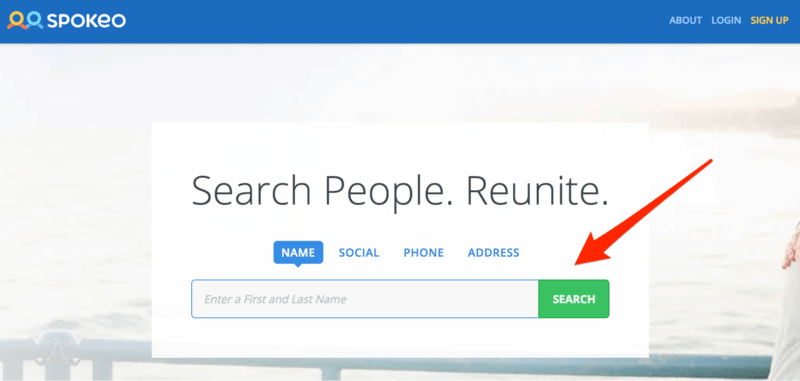
Click “SEE RESULTS” Button
After you have located your record amongst the other listings for your name, click “SEE RESULTS”. This should be a green/white box to the right of your nameplate (see below).
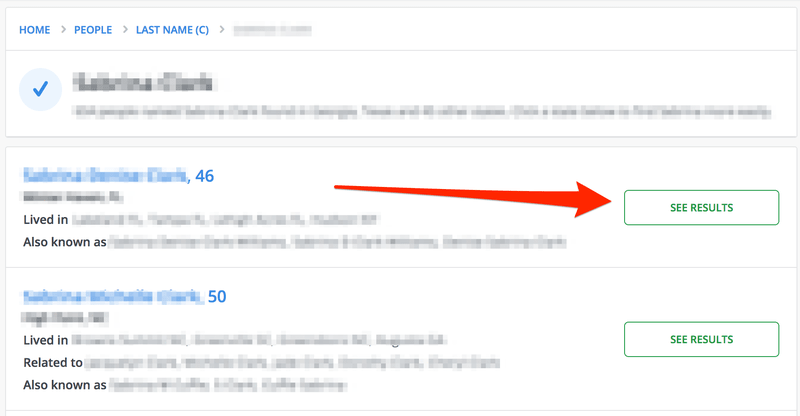
Copy & Paste Webpage URL
At the top of the page, located in the address bar, simply copy the URL for the webpage. You will need this for later so make sure you paste to onto a notepad for the time being.
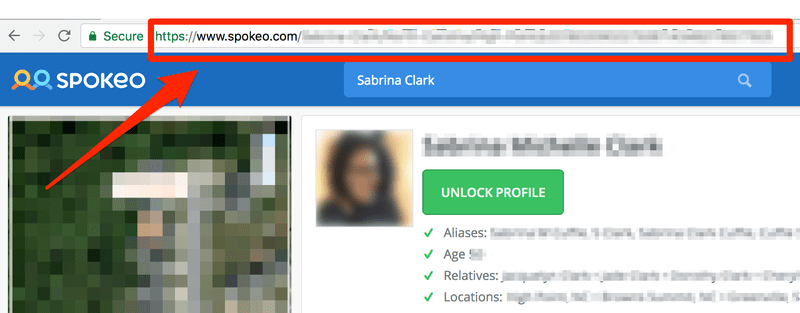
Scroll Down, Click on “PRIVACY”
After you have stored your Webpage URL in a safe place for later, scroll all the way to the bottom of the page (your record). Click the anchor text that says “PRIVACY”. This will redirect you to a new webpage that will ask for more information. This is when you will need the URL we saved earlier.
Next, scroll all the way down on the “PRIVACY” page until you see “OPT-OUT”. Click on “OPT-OUT”. This takes you directly to the Spokeo opt-out page.
Submit Webpage URL into Opt-out Form
Finally, you are redirected to complete the final step of the Spokeo removal process. This is where 2 key pieces of information will be needed in order for you to submit the opt-out form successfully.
- Email Address (use the new one you just created)
- Webpage URL (web address for your specific record)
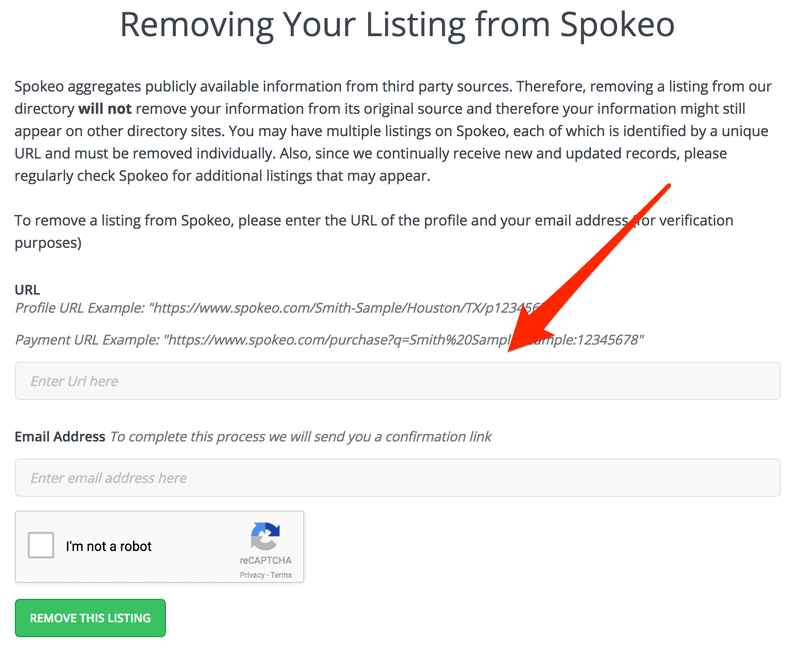
Be Patient
Lastly, be patient while waiting for your Spokeo removal to be finalized. As you can imagine there are dozens (if not hundreds) of individuals submitting opt-out forms on a daily basis. Give the website time to update (1-2 weeks) before you try to repeat the process.
If you are still struggling to remove your information from Spokeo.com please complete the form below. GuaranteedRemoval.com provides a comprehensive background removal solution that clears your name from over 50 people search websites in as little as a few weeks. Learn more now!
Oops! We could not locate your form.
Why It’s Important To Repair Your Background
It’s important to repair your background for many reasons. This article acts as a resource for you to determine why it’s important to repair your background right now, assuming that’s your goal, and action steps necessary to take to make this goal a reality. You will soon discover why more people and business owners choose to Guaranteed Removal exclusively to manage their reputation.
The names Toyota, Disney, Amazon, and Coca Cola often make into the list of the most popular brands in the world. Why is that? It’s because these brands have successfully won the trust and loyalty of their customers. In addition, they have a powerful background story supporting their brands.
Very few organizations pay attention to the importance of having, improving, or narrating their background stories. For them, it’s just a thing of the past – something that doesn’t make the cut for investing time and money on.
Ever noticed how the “About Us” page of tons of local businesses tends to be the most poorly designed and miserably worded part of their website? It’s because they don’t think it’s important enough. Now, that’s where they are wrong.
Oops! We could not locate your form.
What’s On Your About Page?

Look at it this way. You just moved into a new town and want to look for the best local plumbing service. On asking around, you find people’s opinions divided over service A-Plumbers and B-Plumbing Service. Now you decide to do a little research on your own, so you check out to their websites.
Both companies provide similar services and are equally popular among the local community. However, the “About Us” section on the A-Plumbers website carefully narrates the compelling story of the business’ humble beginnings. This family-based business started with 3 people that are now more than 100 employees serving the local and surrounding communities.
In contrast, the same section on B-Plumbing Service’s website includes just the year it began operating and the areas they serve – giving you practically nothing to understand about the business, its background, the people who run it, their values, their commitment to their profession, or why they are well-liked within the community.
Looking at it from this perspective, most people would choose the services of A-Plumbers. Why? Because, even though they’re new to the town, they seem to connect with the way A-Plumbers present themselves. They don’t appear to be strictly business – their story humanizes them, invokes an instant bond with customers who can see there is more to them than just fixing pipes and quoting bills.
What About Social Media?
We are often asked, “what about my social media channels?” Does it matter what I post or what others post about me? And if so, how does this affect my reputation? These are all great questions. The short answer is that everything that is published on the internet matters. Think of your reputation as a rosebud. Every time someone posts a negative comment, picture, or video about you or your company, it’s as if a gardener trims a stem or brand new bud that temporarily shortens its growth.
Guaranteed Removal suggests:
- Disallowing people to tag you in images on social media.
- Remove pictures of you partying with your friends in high school or college.
You see, your reputation, while fragile, is reparable. Think about it another way, how many celebrities do you know who’ve had a brush with the law or were publicly shamed over and over again 5-10+ years ago? How are they now? If they are still with us, they’re likely doing very well, if not thriving today.
This leads us to our next question…
What’s Does Your Background Say About You Online?
Most people and certainly most businesses have an online store. The Dropbox founder – Drew Houston came up with the idea for a cloud-based file sharing platform because he kept forgetting his USB too often, creating trouble for himself during his days as a student at MIT. If no one else, a university student would definitely know the pain of constantly forgetting a USB drive!
So, now that our society is hyper-connected via smartphones and WiFi, the need to curate a positive and authentic internet presence is vital. It will mean the difference between getting your dream job, client, or attracting your ideal business partners. Your internet visibility lets people know what you’re about, what’s important to you, and how you want others to see you.
Now’s a great time to ask yourself “what do you want to be known for and know as?”. What’s the difference? The question “what you want to be known for?” relates to what other people say about your accomplishments or failures. A better way to explain this is to use an example. Therefore, Christopher Columbus is an explorer who arguably “discovered” the Americas. He’s known for this event and yet he’s known as an “explorer”.
This means that in your business or your everyday life problems will arise. Someone may attack you and post revenge pictures, videos, or articles on you or your company. Their frustration, whether valid or not, will affect your reputation if it goes viral.
So, what do you do? If your online background isn’t 100% “ideal” a good option is to suppress “bad” information with positive stories and news that can hide old less favorable data. For example, if you’ve just won an award or a new promotion, this is the golden nuggets of reputation ready to repair your background or have more questions about our process, contact us today.
Oops! We could not locate your form.
Help, I Need Emergency Reputation Management Services!
What if you or someone you know is in desperate need of emergency reputation management? That’s why solutions like Guaranteed Removal exist. ER, or emergency reputation, companies work quickly to protect and manage your privacy and restore your online reputation. The goal is to limit too many people access to your information. We all know that if your reputation or the reputation of someone you know can wreak havoc easy and immediate support is available. Learn more about how to remove posts from the cheater site.
How does it work?
When you’re ready to improve your reputation online, you’ll contact one of our reputation management experts. He will research your individual case and answer any remaining questions you have. Within a few hours, you will receive an analysis via email with exact details on ways we’ll repair your reputation.
For instance, if a mugshot, an arrest record, or negative reviews are found by you online, we will find it and remove or suppress this content to fully restore your internet identity.
Can I Do This Myself? – DIY Reputation Management
If you seek to repair your reputation on your own, there are two main ways to proceed. First, make sure you have plenty of time to call and email these various website owners. You may need to reach out to them multiple times before they will remove your information from their website or social media page. To reduce a bit of time search for the owner of a website, use this site: Whois.
Next, be sure to search the top search engines for additional potentially harmful information. If you choose this route, you’ll need to invest time locating each image, video, or article published about you. To reduce some time going this route, use sites such as https://whois.net to locate the owner of the site where harmful content exists.
Without a valid reason for them to remove this information, site owners aren’t at liberty to do so. Plus, Google rewards websites that consistently publish new content, even if it is negative because it can improve their site rankings.
If the above doesn’t work, you can request removal directly from Google. Once you land on this site a video will show you how to submit the request. There are no guarantees that Google will accept your request, however.
What to look for in a Reputation Management Company?
At this point, you likely realize that professional reputation management is necessary for improving your online presence. So, how do you decide which company to choose? Here are 3 questions you want to ask:
- Do you guarantee your work?
- Removing an arrest record or a mugshot requires significant work. Make sure the company will not charge you again if the same record or image appears on the same website.
- Do you have a legal team?
- Not many reputation management companies have a legal team on staff to issue “takedown notices”. If a legal team is not on staff, expect to make a lot more for your reputation management.
- How long will it take to remove my information?
- The answers you receive will vary based on the company you call. Some companies are faster than others. They have a full staff of professional SEO and content strategists who work quickly to repair your background. Depending on your situation the process can 72 hours up to a few months.
I’m Ready to Repair My Background, Now What?
With the information above, you are fully aware of what it takes to improve and repair your background online. Once you call us, we will answer your questions as well as request some basic information from you.
Therefore, if you’ve found any information that negatively impacts the reputation of someone you know, contact us immediately. Contact our emergency reputation management agency today.
Oops! We could not locate your form.
Remove Personal Information From Google
We cannot always control what appears about us online. It is important that you do not wait to remove personal information from Google. This is quite a hot topic presently because people feel they have a right to privacy online.
Pew Research Center surveys have shown that 86% of people have attempted to remove content and personally identifiable information from Google reputation management. Tactics such as email encryption, cookie clearing, hidden IP, and more. While these things work, it may take time to outrank the negative content appearing.
Online Reputation Management is the strategic method used to ensure you remove sensitive personally identifiable information from Google once and for all. Consider, for a minute, that some 1,000,000,000 names are Googled each day. So essentially, someone enters your name once a week. It is important to make sure what people find is flattering and positive.
Advanced background checks are now conducted by schools, employers, prospective dates, landlords, and more. Say goodbye to “first-impressions”. Indeed, around 42% if those one billion daily name searches help people to decide whether or not to do business with the person they have searched for. Clearly, the results that come up are a powerful influencer. Therefore, clearing your name and personally identifiable information from the search results isn’t just about privacy on a web page, it is about your future.
Oops! We could not locate your form.
How to Remove Information from Google
There are three main steps to clearing your name from Google:
- Prevention. This is about blocking the information from appearing in the future.
- Removal. This is about convincing a web page to remove your personal contact information online.
- Suppression. This is about making sure that the personal contact information you can’t get taken away won’t get found.
Prevention is always better than cure. It is about being proactive, stopping bad things from appearing right away. If you can prevent negative information from appearing in the first place, you won’t have to take action to remove it.
Whenever you engage in anything online, ask yourself whether those actions speak positively about your personal brand. It is about reflecting on how you want to present yourself. In fact, experts feel that everyone should have a formalized personal mission statement.
This should include core objectives and values, which you then have to stick to. Finding other personalities online with the same values and objectives is a great way to find examples of how to present yourself.
Those who have a successful Online Reputation Management should be seen as an inspiration to you. They have taken control of their personal brand and you can do the same.
Read more about the most common branding mistakes!
Do you have to ask yourself why or how to remove articles from the internet? You need to prioritize that for removal first. Remove your personal contact and physical address details, embarrassing photos and videos, private conversations, financial details, email addresses, work addresses, your arrest, and criminal records first.
Furthermore, remove your personal and intimate videos and photographs, copyrighted materials, negative reviews and press, and outdated information are all important to have removed.
DO YOU NEED ONLINE REPUTATION MANAGEMENT?
You will be happy to know that most of these are reasonably easy to remove personal information from Google. Indeed, sometimes, you are protected against these posts through federal laws. However, there are also pieces of information that belong to the site owner or webmaster and it is up to them to decide whether or not to remove it.
Mastering how you remove personal information from Google will only quicken the process. Again, this is why prevention is so important. This is also why you should write your own list of information, like your physical address, personal data, bank account, etc, you do not want to appear online and determine which pieces are most important to keep hidden.
You also need to ask yourself what kind of preventative steps you are currently taking. It is likely that there are a few things you should do but haven’t done yet, such as opting out of white pages and other public listings.
So, now you are a few steps closer to learning more about how to remove information from Google. Google reputation management should be one of your main concerns.
Viable Security Methods
- Having strong and unique passwords for all the websites you use. Purchase a good password manager so that you don’t forget your passwords but don’t have to write them down either.
- Using secure networks on your internet connection. Public WiFi networks are useful, but you should never use them for anything personal.
- Having secure backup systems in places, such as an external hard drive or a secure cloud account. All data brokers that you hold on your different devices should be regularly backed up.
- Updating all your software and hardware. While many of us don’t like to go through updates, they aren’t just to change some of the cosmetics of your operating system. Rather, they are about addressing any vulnerabilities that have been found in the system. Having a reliable computer allows you to actively remove personal information from Google.
- Having an up to date antivirus and antispyware package in place. The software is often built-in but regardless thereof, you must make sure automatic updating is switched on. This will ensure that you’re always fully protected from hackers, malware, viruses, and other such things.
- Having a fully secure email address. If you use multiple email accounts, you should check all of their terms of service and find out what problems they often encounter. If you can get better protection from a paid email server, consider investing in it.
- Only use verified apps on your smart devices. Do not log in through the web browser you use on your phone, but use the verified app immediately. This will also ensure you can automatically update the app as and when needed.
- Keeping all physical copies of your personal information is secured locations. A safety deposit box is always a good idea.
Oops! We could not locate your form.
Alternative Methods On How to Remove Information From Google
A basic understanding of the above steps will make it far easier for you to be proactive about your information on Google. You may also engage in other security measures, which should all write down. This will give you a good overview of whether or not you are behaving in a responsible manner.
There are other things that you can do immediately to stop your private information and details from becoming readily available. The internet seems to have transformed into a huge database of personal information.
It is easier than ever to find someone’s phone number, home address, how long they have lived there, email address, and more, simply by entering someone’s name on Google. Because there are so many data brokers and websites, it can be quite difficult to remove sensitive personal information from Google, it is hard enough finding the content.

Again, this is about being proactive and making sure you don’t appear at all. The white pages are the first place you should head to in order to enlist yourself. And you must make sure that you don’t automatically connect any online accounts together, as this information could easily be sold. While that must be mentioned in the terms of service, most people never read those.
You may want to have a PO box or list your place of work as your home address. If you want to set up your own website, you should never list your sensitive personal information on it. Rather, have a separate email address that keeps your personal details private.
Under ICANN law, all information that is linked to domain registration is a matter of public knowledge, which means you won’t be able to remove this information from Google.
CONTACT US TODAY FOR A FREE CONSULTATION
Prevention is also absolutely vital in terms of unflattering, embarrassing, and humiliating photographs and videos. Unfortunately, sometimes it isn’t possible to stop someone from making those videos and photos. However, you can protect yourself. This must start with you not posting anything that can be taken out of context.
Remember your personal mission statement and make sure your own images and videos are fully aligned with your professional image. Do not post anything that does not fully match this.
If someone else were to have posted this inappropriate content, it becomes a little bit more difficult, albeit not impossible, to have it removed. We live in the day of smartphones and anything embarrassing or humiliating you do in public is likely to have been videoed and shared.
Hence, think about how you behave at all times. You should also never participate in taking intimate photographs or videos since those could easily find their way online through “revenge porn”.
Chats are also important. There have been many stories of prominent figures making jokes in a private chat that were incredibly inappropriate and that they made their way into the public domain. Email conversations, private chats, and other such messages are not truly private.
Having secure networks and connections in place will ensure that no third party can see what has been said, but you do have to consider that those people you sent the message to will eventually share it. The danger to your Online Reputation Management does not lie solely in hackers and malicious cybercriminals.
It can come from someone who is angry with you as well. Again, therefore, whenever you send something electronically, whether through email, IM, PM, Tweet, or any other digital medium, don’t say anything you wouldn’t happily say in public as well.
– Do not post something online you would not want your mother to see –
You must also prevent very sensitive information such as your medical history, your Social Security Number (SSN), or financial details from making their way online. Not only can this ruin your Online Reputation Management, but it can also lead to identity theft.
Thankfully, because of the fact that this information is truly classified as private, it is reasonably easy to have it removed. However, again, you must be proactive and ensure it doesn’t appear online in the first place. Make sure you store your details in secure places and that you don’t share any of it on untrusted websites.
Arrest records, criminal records, and how to remove mugshots online. Meanwhile, they are all part of the public domain. The only thing you can do in terms of prevention is making sure that you don’t break the law or are suspected to break the law. Again, things can be done to remove this information from Google.
In relation to things such as negative reviews and press and copyright information, you must always maintain proof that you own the intellectual property. For revenge porn, this proof of intellectual property is key. Filing a trademark or watermarking anything that you own is also very beneficial.
Last but not least, you must make sure that any biographical information you do want to have publicly available is up to date and that all outdated information has been updated or removed. This will also ensure that you rank for positive things on Google, instead of for negative things. Maintain a list of all locations that store your information so that you can update them all whenever needed.
Oops! We could not locate your form.
Step 2 – Removal
No matter how proactive you have been, it is likely that there is already some information out there about you that you are not happy about. It is important that you regularly enter your own name in Google to see what comes up so that you know what you are up against as well. Thankfully, removal is possible, but you first have to understand what that is.
When you ask Google to take something down, they don’t actually physically remove and keep personally identifiable information private from Google. Rather, they de-index it. What this means is that the pages will no longer appear in the search results. If, however, someone who is looking for you knows on what website something was posted, they will still be able to find it through there.
Ultimately, however, your goal is to make sure that people no longer see any negative results. This can be done through suppression, de-indexation, and deletion, each of which is slightly different.
Looking first at de-indexing, this is what engines like Google will usually do if they receive a takedown request. Deleting a site or page from a site completely is very rare. Hence, when people speak of “removing something from Google”, they usually mean de-indexing.
When something is de-indexed, it simply means that it will no longer appear on the search engine that de-indexed it. The information is still out there, therefore, but Google won’t let it appear in the results anymore. The result is that it is far less likely that people find the information about you that you want to keep hidden. However, the threat is still out there and an astute searcher will be able to find it.
Do you know how to remove online reviews?
CONTACT US TODAY FOR A FREE CONSULTATION
Then, there is deleting something from a page altogether. This is possible, but it is difficult because only the site owner or webmaster is able to do so. Of course, it is always worth asking the question, and, in some cases, there is a legal case to be brought forward to having them remove personal info from Google.
If they delete it, then it means it is actually completely gone and it is gone for good (unless it is reposted). When a page is deleted, it will still show up on the search results for a while, until the web crawlers realize that it isn’t there anymore. Hence, you should also opt for de-indexing.
There are, unfortunately, disadvantages to both de-indexing and deletion. The biggest disadvantage is that it doesn’t really offer any guarantees. The website in question may have a cached version for instance, which can still be accessed.
Additionally, there may be screenshots of the post and the physical information may still be out there and simply find itself reposted somewhere else.
Suppress those bad comments online, time to start over. This is completely different and essentially relates to properties and processes that are within your control. If searching your name reveals negative results, your goal is to post more positive things instead, ensuring they rank more highly in the search engine results.
Ultimately, and with a substantial amount of effort, this means that the positive results are easier to find than the negative ones. The reality is that most people don’t look further than the first few pages of the search, so if you can stop the negatives from appearing there, they are as good as hidden completely.

The Law is on Your Side
- The Digital Millennium Copyright Act (DCMA), which you can apply to copyrighted work in the United States. This was signed into law by President Bill Clinton in 1998 in an effort to stop services, devices, and technology to be disseminated so that copyrighted works could only be accessed with the proper control. Additionally, the Act means that when people circumvent those controls, even if they don’t infringe on the copyright, they are guilty of a criminal offense. However, it applies mainly to online users and is hard to apply to intermediaries such as internet service providers. Hence, the DCMA is important and useful, but it is also limited.
- The agreement of Google to de-index any sensitive information for users based in the United States. This includes SSNs and credit card numbers. Essentially, Google has agreed that, if any information is posted online that could lead to financial harm or identity theft, the person that refers to can ask for the information to be removed. This does not, however, apply to your personal mailing address. Google will also usually remove any child sexual abuse imagery as well as revenge porn. Effectively, you need to be able to demonstrate that there is “sensitive information” that you wish to take down. The Help Forum from Google is very good to help you determine whether or not they will agree it is classified as sensitive.
- The Right to Be Forgotten. If you live in the European Union (EU) or in Argentina, you have the right to be forgotten by Google and the other search engines. What this means is that it is far more likely that you will indeed be able to have your removal request granted. However, you do have to meet the relevant criteria for this first.
- You’re in control because if any of the information that exists is on pages you own, such as your blog or your social media accounts, you can take it off yourself. The impact of negative social media can be devastating. It is quite surprising to see just how often the embarrassing information that people want removing comes from their own online accounts. You do have some power, therefore, and you need to exert it. Remember that all that information you posted on old social media pages, such as Hyves and MySpace, is still out there. You still have control over that, however, and you can still remove it. Make sure you think back about all your different accounts, no matter how long ago, and consider whether there is anything on there that you would rather not be in the public domain. While you are checking those, be proactive, and change your password!
- It doesn’t hurt to ask. If information about you is posted on someone’s website, you can always ask them to remove personal info from Google. A polite request can go a long way. Sometimes, people create memes and other such things and forget that they are dealing with actual individuals. A brief, polite reminder of that can work and is certainly worth a shot. Doing this is important because if the webmaster or site owner actually removes the information, it will also be taken away from the cached version. Of course, as previously mentioned, this does not offer any real guarantees, as the person could refuse your request, post the information elsewhere, or even be more inflamed by your request and share it even further as a form of retaliation.
Again, however, this is not an overnight process. You have to work really hard at building a foundation of your personal brand and you have to keep working on it. Over time, doing so will ensure your positive information overtakes the content that you want to keep hidden. But you also have to keep working at it.
Once you have been able to suppress the information, it won’t stay suppressed if you suddenly stop engaging in authoritative optimization practices across all your websites and all your social media accounts.
Suppression is a strategy that focuses on organic engagement, branding, SEO (Search Engine Optimization) properties, creating high-quality content, and remaining up to date with changes in the search engine algorithms.
Our team of reputation experts actively works on Ripoff Report removal solutions as well as any other unwarranted negative posts online.

Three key principles to suppression
- The creation of your baseline brand. This is harder then it sounds because you’re building your foundation and what will be the starting point of all Online Reputation Management. You must start by having all negative and irrelevant content that you have control over removed. Stop missing out on articles about you, sign up for Google Alerts. You must start by knowing what your current online presence is. Google Alerts will notify you via email the moment a new article is published. Consistency will help when it comes to your SEO practices and rankings online. You may also need to create more social media accounts across platforms. This is how to remove information from Google’s search results, or at least hide it.
- Building up your authority, credibility, and audience. ‘Business trust’ is not enough, you need loyal customers that will share your content with friends. Finding thought leaders and influencers in your area. Creating content for relevant, authority websites, and getting to know the demographics of your audience is vital for this.
- Finding new opportunities and going for them. Once you have an audience in place, you have set yourself apart as an authority. Actively engaged in various social media platforms is a great way to generate a following. In addition, you will have to create new opportunities. These simply come along but you also have to monitor online developments and changes and grab opportunities proactively.
CONTACT US TODAY FOR A FREE CONSULTATION
Online Reputation Management is time-consuming and most of it comes with no guarantees. Sometimes, your efforts will only succeed a little bit. Requests may be addressed but often replaced with something else. This is why it is so important that you properly build your brand.
When you suppress information, you ensure that no information exists that could tarnish your good reputation. Since you have built trust you will have time to make amends to the negativity.
Personal branding is complex, but help is out there for you. Software packages exist that will guide you through the entire process. Helping you to create the right properties and the right content at the right intervals. Ensure your actions match with what web spiders and crawlers are looking for if it is to be effective.
If it is, however, you will be able to make great steps forward, finding new professional and personal opportunities. But do remember that it is a process. You must monitor your results regularly in order to take action quickly and efficiently.
Remove Google Search Results for Existing Websites
Once you have discovered a website you deem harmful or negative there are some steps you must take before reaching out to Google. As we mentioned earlier, Google search and search results are an unbiased platform so calling them and complaining about a certain website will not do any good.
Furthermore, we have limited censorship online so there are no laws implemented currently that obligate Google to remove because an individual “doesn’t like it”.
The most popular example of this would be Revenge Sites=. These websites were designed to vent and talk about your ex-spouse or ex-girl/boyfriend publicly. This includes posting photos and writing somewhat defamatory articles for anyone with an internet connection to read.
Revenge sites such as ShesAHomeWrecker has turned into a platform for the spiteful and morally corrupt. This act is often done in a fit of rage stemming from a recent divorce or legal battle. It is important to take these websites seriously because doing nothing will not make matters better.
In fact, leaving a website up for too long gives it the ability to gain traction and authority, possibly ranking higher over time. Many individuals who are posted on revenge sites can check by simply ‘Googling’ their phone number.
It is important to note that Google WILL NOT remove unless the website has removed the information. If you feel the matter could have been handled legally, sending documents such as DMCA takedown notices or cease and assist letters could “scare” the website owners into removing the content.
If the webmaster does not comply with your requests, unless they have unlawfully posted the information, there is, unfortunately, no way to have it forcibly removed. There are several exceptions such as cheater sites and revenge porn. These articles are typically pulled down automatically from Google, Bing, and Yahoo. Learn more about Cheater Sites today.
Oops! We could not locate your form.
Remove Google Search Results for Outdated Cache
Your dream job becomes much simpler if the content has already been removed. When you click on a website and it prompts a 4xx or 5xx error that is perfect. This means the webmaster has removed that page from their site. If this is where you are starting out, the removal process (or deindexing process) is basically done for you.
In a recent update, Google redesigned how they are notified to recrawl a particular website. In the past, you could simply visit the Google Search Console and copy/paste the outdated URL. Press submit and you are done. Now it takes a little more effort to expedite the time it takes to remove Google search results.
Next, you will want to visit or revisit DomainTools. This is again where you locate any email addresses or phone numbers for the website owner(s). By emailing or calling them, you can ask them to disallow that exact page on their sitemap. A sitemap is what Google looks at when recrawling each website for any updates or new posts.
By disallowing a certain page, you are telling Google you DO NOT want that to appear in their search results. After about 2-3 days of notifying Google, they will update their results to reflect the change.
Hiring the Professionals How to Remove Personal Information from Google
Sometimes, you will need to bring in some professional help. Doing so means looking into how good and honest that company actually is. Removing information from Google can be difficult if the content is still appearing.
The result is that reality also is that you will have to rely mainly on properly branding yourself. But, if your personal data has been subject to financial fraud, you have websites displaying personal data like medical records in search and there are Google searches involving that data we can help!
A good Online Reputation Management company will ensure all your profiles are relevant, up to date, and fully optimized. At the same time, they will teach you how to brand yourself and how to take preventative measures.
You must remember that you are only in control over your own sites and accounts. Optimization of positive content is key when figuring out how to remove your information from Google.
Hopefully, the information provided above will assist in how to remove sensitive information from Google. Focus on all three elements – prevention, removal, and suppress bad comments online. Do this, and you should be able to build a positive online image and personal brand.
This, in turn, will ensure you have more opportunities, both professionally and personally. Remove personal information from Google today!
How GuaranteedRemoval Can Help
We have worked in the Online Reputation Management industry for the past 5 years. During that time we have procured partnerships with the top media publishers in various industry.
Whether you are working to remove your information, news articles, or other info that would lead to unwanted direct contact from Google you need to submit removal requests to the service. Our professionals here can help you submit these removal requests and know how to follow Google’s global policy lead. Google receive removal requests every day, set yours apart by making sure it’s perfect the first time and coming from a professional team.
Hide the negatives and promote the positives with GuaranteedRemoval. Call us today, waiting will get you nowhere. We offer a FREE CONSULTATION, what are you waiting for?
Oops! We could not locate your form.
Can You Repair Your Past? | Reputation Management 2021
Can you repair your past with reputation management? This article explains the exact steps necessary to clean up your background with a reputation management team. We all make mistakes in our lives, and, sometimes, people will use those mistakes against you. You can’t undo past behaviors but you can make sure that you no longer become the object of gossip. In this article, we present a number of strategic actions that you could take to achieve this.
There are five major steps to repairing your past to manage your reputation. One of the first questions to ask yourself is whether your past needs repairing. The truth is each of us may need some form of reputation management during the course of our lives.
Oops! We could not locate your form.

How to Repair Your Past with Reputation Management
1. Ignore What People Say
First, you have to stop listening. If you regularly remind yourself of the bad things you did, it is bound to affect you. Hence, learn how to stop taking it personally.
“A person is not affected emotionally by what happens around them, but by their interpretation of what happened. In turn, our interpretations are formed by our beliefs.”
2. Decide On Your Desired Image
Next, you have to decide how you want people to view you instead. Forget about the things that happened in the past and think about the future. It takes a long time to build a reputation, but it would take even longer if you don’t know what you want that reputation to be!
“Know what your brand stands for, and know what your brand promises. Your brand promise should be precise and attainable, and you should be able to communicate it clearly.”
3. Bring in the Professionals
You may also want to work with a professional reputation management company to help improve your reputation. We know how to develop strategies and action that improve your reputation. We also know how to remove negative comments or suppress your past so that it will no longer haunt you. Mainly, we are on your side and we understand what you are going through. A professional reputation management service such as ours offers a number of important benefits.
4. Be Honest
When people attack your reputation, you can turn things around by owning the narrative and controlling it. Repairing your past becomes second nature. Those who attack you hope that they can point out your flaws. If, however, you immediately accept that you have made mistakes, and point out how you have improved since then, you take the power away from them.
5. Make the Necessary Changes
If you truly are honest about the mistakes that you have made, then you should also be able to see how and where you can improve. Hence, you must put actions in place to make those improvements. For instance, if you delivered poor customer service, you could invest in your employees to improve this. If you have a reputation for overcharging, you could offer a price guarantee. People are very forgiving, particularly if you demonstrate that you have learned from your mistakes.
As long as you have an open mind, you can learn from every experience you have, whether it’s good or bad.
What’s Next?
Repairing your past with reputation management is a complex thing. On the one hand, reputation is your most valuable asset. On the other hand, it is also something you have no control over. No matter how hard you try to do things right, there will always be skeletons in your closet waiting to come out, there are always mistakes to be made, and there are always people just waiting for things to go wrong.
Therefore, the best you can do is to give them as little opportunity for that as possible and, mainly, to consider every experience as a learning experience and turn it into a positive.
Within the next three business days or 72 hours, a reputable removal service can have your negative information removed or dramatically suppressed. If you’re ready to repair your past or have additional questions, contact us today.
Oops! We could not locate your form.
How Are Employers Viewing Background Checks?
Employers are viewing your background. You may be wondering whether your prospective employers are looking into your background. The simple answer to that is: “yes, they are”. They do this for a variety of different reasons. You may need government security clearance or have significant financial responsibilities. In addition, you may be working with vulnerable people and employers want to know if they can trust you.
Either way, more and more, background checks are becoming a standard procedure during the hiring process and it is vital that you are aware of this. A recent survey by Endora reveals the extent to which background checks are conducted – and why, sometimes, they aren’t.
While more than 98% of businesses conduct pre-hire background checks on potential new employees, less than one-quarter of businesses proactively screen current employees – exposing CEOs and Boards to significant safety, security and compliance risks.
Oops! We could not locate your form.

Is it Legal for Employers to View My Background?
Thus, if you are curious whether there are employers viewing your background, there is nothing wrong with prospective employers conducting a full background check. You will usually have to give permission, which means you will be aware of these checks. Furthermore, the federal Fair Credit Reporting Act (FCRA) is there to protect your rights as well.
The federal Fair Credit Reporting Act (FCRA) promotes the accuracy, fairness, and privacy of the information of consumer reporting agencies. There are many types of consumer reporting agencies, including credit bureaus and specialty agencies, i.e., about check writing histories, medical records, and rental history records.
Employers viewing your background take into consideration the FCRA regulations, which also stipulates how old the information contained on these reports can be. This means that you should know yourself exactly what a prospective employer will find out about you. Should any of that information be less than positive, you may consider disclosing this before the search is complete.
That said, prospective employers also perform other types of background checks. One of these is to ask you for past references. These will usually be employment references, unless you are fresh out of school or college, in which case they can be academic or even personal references. These references are designed to get to know you as a person and worker.
What About Internal Privacy Policies?
Keep in mind that, even if an employer asks for the background information listed above, and it is legal, the former employer does not have to answer. Many companies limit what they will disclose about former employees. Sometimes this is for fear of lawsuits for defamation. Other organizations may not release information due to internal privacy policies.
The other thing that many employers will do is screen your social media profiles. This, they believe, will give them an even greater insight into who you are in your personal life.
Employers Viewing Your Background, What’s Next?
Be aware of the fact that employers will look you up before they hire you. Clean up your social media profiles, get copies of your credit report, arrest records, and “Google” your name for more information, etc. Therefore, to make it difficult for employers to view your background online remove any negative items you find about you.
- Remove them yourself. Ask the website owner (s) to delete the damaging information about you.
- Contact a removal team who works with a legal team to remove your negative data
Either of the above two methods will eliminate any doubt about what others will find when searching your name in Google. In fact, you should ask for a copy of your personal Lexis/Nexis Accurint Person Report, which is a free report. This report prepares you for what a prospective employer will see about you. If you don’t like what you see, then contact a reputation management firm, like Guaranteed Removal, to help you improve it.
Employers are viewing your background, unfortunately, if you have questions about how to clear your background quickly and safely, contact our professionals.
Oops! We could not locate your form.
How To Suppress Bad Comments Online?
Suppress bad comments online is a top priority for people concerned with their online reputation. The online world is completely public. Whenever someone makes a bad comment online about you or your service or product, the entire world can see it.
Unfortunately, people tend to make a judgment about you based on a number of different things, including:
● How long it took you to respond to a negative comment
● Your response.
● How the customer felt about your response
● The resolution of the complaint
Oops! We could not locate your form.
 The internet is all about speed. When someone makes a bad comment, it can go viral and around the world in the blink of an eye.
The internet is all about speed. When someone makes a bad comment, it can go viral and around the world in the blink of an eye.
People are also online 24/7, which means they can access information at any time during the day.
Hence, if you care about your online reputation, you need to have your finger on the pulse at all times.
Suppress Bad Comments Online – Your Quick How-To Guide
There are a number of things that you can – and should – do if online comments attack you. As explained above, the fact that you respond and that you respond quickly are of key importance. You should also:
1. Never be Defensive
When you notice bad comments being made against you or your business, it can be tempting to respond in an emotional and defensive way. However, you must avoid this at all costs.
When faced with a negative comment, don’t consider it a reflection on you personally or on your business. Avoid being defensive when handling the comment. A defensive reaction from you can quickly escalate the issue. It’s best to be accommodating, polite and truly listen to the person complaining.
Remember that a bad comment does not mean that you are bad. It simply means that someone is not 100% happy, which can be due to a variety of different reasons. Don’t take things personally, but handle them professionally and politely instead.
2. Apologize and Offer a Solution
Bad comments are negative, by their very nature. However, they are actually a good thing, so long as you treat them properly. They are good because they offer an opportunity for you to learn how you can be even better. They are also an opportunity to show other customers that you know how to listen and you truly care about your customers. Hence, when you see a bad comment, you need to apologize and try to offer a solution.
“This is your opportunity to turn a disgruntled customer into your brand’s evangelist! This person (or people) obviously had some sense of loyalty to your brand if they’ve spent their money with you, “liked” your Facebook fan page, and/or followed you on Twitter.”
Did you know that only 20% of people who are unhappy take the time out to complain? This means that those who have left the bad comment are still approachable for a resolution, or they wouldn’t have contacted you at all. Furthermore, by apologizing to them and offering them a solution, you are doing the same for the 80% of complainants who did not take the time out to talk to you. This is one great way to prevent the need to suppress bad comments online.
3. Post Fantastic Content About You
Last but certainly not least, when you suppress your bad comments online, you need to make a full commitment and effort. What this means is not that you physically remove each item, one-by-one. As you can imagine, this can be almost impossible to find everything. If you highlight many positive things, these will go up the search results while the bad things will quickly drop down in the search results.
You’d be amazed at how consistent educational, informative, and inspirational posts and efficiently good press can outweigh anything bad. Learn how to remove articles from the internet while promoting yourself in a positive light.
Be quick, be apologetic, offer a solution, and be proactive in terms of sending out information that is positive and places you in a good light. Those are the best options available to you in terms of dealing with bad comments online.
Suppressing each bad comment about you or someone you care about online can be time-consuming. If you are ready to get started or have additional questions to suppress bad comments, contact us today.
Oops! We could not locate your form.
7 Ways To Be Responsible For Your Reputation
Reputation is said to be any business’ or individual’s most important asset. You also do not have full control over it. After all, you never know what others are going to say about you, and no matter how hard you try to portray yourself in a positive light, there will always be some people who will find fault with what you do. Nevertheless, you do have to take responsibility for your own reputation. In this article, we present 7 ways to be responsible for your reputation.
Oops! We could not locate your form.

1. Focus on Your Foundations
You need to make sure that you get the basics right.
“You need to build on a solid foundation. Whatever business you are in, you need to do the simple things really well. People won’t notice if you get them right, but if you get them wrong, they will complain bitterly.”
2. You Must See Your Reputation in a Strategic Way
Secondly, you cannot manage your reputation as a side note. It has to be an integral part of everything that you do, which means looking at it strategically.
It’s hard to implement anything unless you have an effective strategy in place. Look at the elements of a solid recommendation.
3. Own Your Mistakes
Nobody is perfect, and everybody makes mistakes. In fact, to err is human. People can forgive you for those mistakes, but only if you admit to them.
“To maintain a professional reputation as someone who is reliable and trustworthy, own up to mistakes as soon as they occur. Don’t attempt to cover up, ignore or minimize your errors or those of your business.”
4. Always Remain Positive
A bad review or negative comment is never nice. However, if you allow someone else’s criticism to define you, then you will never live it down. You must view things with a positive attitude, even in negative situations.
“Counteracting negativity with negativity is a recipe for disaster. If you can, try to take a positive approach and do your best to present your case online if you deem necessary.”
5. Respond in Time
The internet is a place where everything can happen at lightning speed. Something you do that is good – or bad – can travel around the world in a matter of minutes. People expect you to keep up with this as much as possible, which means that you should always respond as soon as possible.
“When you gain insight, share it where appropriate. True engagement comes from a conversation and conversations can take on all sorts of tangents as we know.”
6. Go Green
Much of the above is about avoiding negative comments and about responding to them as they do happen. But there are also things that you can do to position yourself in a positive light immediately, making you more attractive to prospective customers. One of those things is to go green.
Sustainable business practices mean stable growth to consumers and investors. In today’s oil-covered headlines, environmental efforts show visionary leadership and long-term strategy rather than short term gains.
7. Call in the Professionals
Last but not least, consider hiring a professional reputation management company. Sometimes, things you just have to let the pros take over.
If you believe online reputation damage is imminent, then your best bet may be to call in the experts; that is, it may be time to hire a reputation management company to defend your name online.
Unfortunately, even if you follow the above 7 ways to be responsible for your reputation, you still don’t have any guarantee that you will have a positive reputation. But you are doing all that you can, and all that is necessary to at least deserve a positive reputation. Remember, it takes years to build but only an instant to destroy a reputation.
If you’re ready for help managing your reputation or have more questions, contact us today.
Oops! We could not locate your form.
How Online Reputation Management Works in 2021
Online Reputation Management Process Explained
Are you interested in learning how online reputation management works? In this article, we will define what online reputation management (ORM) is and share some of the most influential approaches and methods we use every day here at GuaranteedRemoval to resolve issues for our clients.
There are a lot of delusions regarding online reputation management. Some individuals think it’s simply monitoring your online presence, while others assume it has something to do with public relationships, yet some literally have no clue about how it can affect businesses and their bottom line.
In this guide, We are going to clarify the purpose of online reputation management in today’s market and business world.
Businesses of all sizes can profit from obtaining a precise framework of its core theories.
Oops! We could not locate your form.
Why Online Reputation Matters
Not only do individuals see the internet as their primary expert of data, however, they also believe what sites such as Google shows them.
Moreso, individuals make choices based on what they discover online. How scary is that?
- 66% of people view the internet as the most credible reference for information about a person or a company
- 70% of business directors have denied an applicant due to something they saw online.
- When scanning online for a nearby business, 97% of individuals religiously read online reviews
- More than 80% of reputation damages arise from confusion or misinterpretation amidst the buzz and what is the truth, or reality
After viewing those statistics, it’s obvious that what happens online influences your life, before, now and in the future.

Mixing On/Offline
In this digital age, the online world is shifting into more of a necessity as they need it to deal with the rest of our activities.
Even if you need to touch a computer, you are using technology every single day. This may be driving your car, adjusting your smart thermostat or even cruising around in your new Tesla.
99% of United States citizen-consumers some form of technology or “smart device” on a daily basis.
This suggests that there are an infinite amount of ways for you to create your digital footprint. Whether it be positive or negative.
Furthermore, you may not believe that individuals are searching for you online, however, there is a great chance people are.
With over 7 Billion people on Earth, it would be crazy to think that not one of them is not looking you up.
Typical causes involve:
- Companies doing pre-interview analysis
- Landowners researching potential renters
- Children seeking to find details of their parents
- Inquisitive significant others, both past, and present
- Previous co-workers hoping to bestow professional opportunities
- University admission committees assessing soon-to-be students
- Insurance firms performing risk evaluations
Oops! We could not locate your form.
How Online Reputation Management Works
Help like this utilizes a combo of public relations techniques coupled with high-level SEO methods in order to build positive online content. These tactic works to push anything negative off of the first page on each search engines’ results.
May entail:
- Designing and optimizing domains
- Generating high-quality backlinks
- Thoughtful management posts
- Social media control
- Managing online reviews
- Content curation
Why Online Reputation?
It doesn’t matter if you are the CEO of a large corporation, a sales director, business executive, a diplomat or even a small business proprietor, your online reputation is your most important asset.
Perversely, whether your search results display positive or negative results, these listings will define the overall online reputation of yourself or your business.
So when is it important to have a positive reputation online?
- Driving an IPO
- Obtaining funding for a business adventure
- Drawing in new potential customers
- Forming a strategic business alliance
- Competing for public office
- Improving your career path
What Are the Benefits of Online Reputation Management
- Make sure your online reputation matches your business or personal brand.
- Lessen brand uncertainty within Google, Bing, and Yahoo’s search results
- Recognize and combat detrimental reputation brand crises
- Defend your reputation and your future with a decisive, accurate web appearance
- Create a network of online connections in order to create more trust and credibility amongst your customers
- Respond to negative and untruthful reviews, posts, and/or news articles.
- Elaborate on preexisting online marketing campaigns that showed success
- Ascertain yourself as a trusted expert online as well as across all social media platforms
You have presumably recognized by now that reputation management does not come with a step-by-step how-to or should you see fast results.
ORM is a long-term plan to preserve and strengthen your online reputation for what happened in the past, what’s happening today, and what you expect to happen in the future.
What type of difficulties can a well constructed online reputation management strategy fix?
Negative Online Reviews
Negative reviews on Google, Yelp, TripAdvisor, and Ripoff Report will cost businesses hundreds of billions of dollars each year. These are sites where customers can leave an unbiased opinion, it is essentially a place where disgruntled customers come to slander and defame businesses. (Click here to learn how to remove negative online reviews)
This is because consumers overwhelmingly believe online reviews when trying to learn about particular products and services prior to visiting their store or website to make a purchase.
Even worse, customers infrequently distinguish the truth amongst genuine customer complaints and fraudulent lower star ratings.
However, don’t panic. GuaranteedRemoval.com can assist you with review management. This way you know what consumers are saying about you at all times. The best part is now you can act fast before the situation worsens.

Unfair Competition
Customers do a lot of investigation online prior to making that final purchase. Moreover, corresponding posts have a notable influence on their ultimate decision.
Wistfully, hundreds of product connection sites are associated with one of the products they are relating to. So that means that many of those sites are in fact controlled by the same company
Unwanted News Articles & Posts
Negative articles are a tremendous online reputation problem for most of our clients. Distressed press pulls down a company’s reputation, and quickly.
This can affect a company’s total revenue, hiring, and employee retention as well as funding. So, financial firms succumb to a massive loss in clients. As investors unload stocks, and customers stop buying or talking about you.
However, negative Google results are not the only thing that affects businesses. False knowledge and public scandals help potential customers determine whether or not a particular company has a positive or negative online reputation.
Unfortunately, when reporters get ahold of a fascinating narrative, they oftentimes distribute it while it’s hot, this means before the truth is released. Even if the story is ultimately disproved, it may stay on the internet indefinitely.
Damage is further increased as false stories are distributed out to hundreds or thousands of readers.
Brand Crises & Attacks on Your Reputation
Online slander is possibly one of the worst obstacles you can have when operating a business. It’s not enjoyable, as a business owner, when negative content is referencing your business online. Furthermore, nothing is more damaging than malicious, opprobrious attacks.
Whether the cause is a dissatisfied past worker, a hostile ex, or a sneaky unethical competitor. You must combat this negativity at all costs. Nevertheless, be prepared as these situations can be remarkably fragile.
Consequently enough, it is sufficient to solicit advice from online reputation management experts such as GuaranteedRemoval before you end up making matters worse.

Uncertainty About Your Brand
Not all companies have uncommon names. If your business name is also a popular word then you may struggle to find decent online exposure.
This does not only limits your online marketing efforts, but it also deters potential customers from discovering your site. If you are interested in learning more about Online Reputation Management visit NetReputation.com
Lack of Brand Clarity
You may have an immaculate online reputation, nevertheless, others who talk about you online (your customers) may not be as careful.
Unfortunately, online personality disorder could cause someone else’s social media profiles, ellicit images, and mug shots to show within your own search results.
You may know which results are yours, however, others might not be able to distinguish between what is about you and someone else that has the same name as you.
Brands are in more danger online than ever before. Fictitious profiles are emerging and they have the power to severely undermine a business’ reputation only if customers think they’re your real accounts.
Misleading Online Profiles
GuaranteedRemoval clients consist of global business directors and contributors who have worked to help change the world.
Although, their personal search results did not explicitly reflect their lifetime achievements.
GuaranteedRemoval will help ensure that your online reputation management is both positive and authentic.
Oops! We could not locate your form.
Remove Been Verified Information in 2021
In this article, we answer the question “why remove your information from Been Verified”. It is important to note that Been Verified is a website that allows people to search for other people, including through public records. This site is one of the biggest of its kind, and it has existed for over a decade now. According to BeenVerified itself, their main goal is to help people find long lost friends, relatives, and others.
Are you searching for someone? People search refers to an online method to locate an individual. With BeenVerified, you can comb multiple databases of publicly available content, including government records, social media records, and much more. Even though the data is public, BeenVerified’s people search might uncover information that you can’t find on Google.
In reality, however, Been Verified is a data broker, meaning their business is to sell information. A data broker, or an information re-seller, is a business that collects personal information about consumers and sells that information to other organizations.
There is nothing illegal about being a data broker because they make the information they collect publicly available. Most of us don’t want to be found nor have people find our private details easily. This is the main reason why you will want to remove your details from Been Verified, and from other databases.
Oops! We could not locate your form.

Why Remove Your Information from Been Verified
There is not much privacy anymore. Anyone can see anything that you have ever done online, or offline and that is a matter of public record. That is what net neutrality and the openness of the worldwide web provide, which also have negative effects. There is now a significant concern, that data brokers like Been Verified are breaking certain privacy laws. These companies are profiting off of you, and you don’t have a say.
However, this company is one of 180 such businesses, and growing, which means that you would need to put a significant amount of work into removing your data.
Furthermore, there is no guarantee that once Been Verified removes your information, they won’t simply put it back up a few days later. Essentially, you need to ask them to remove your data permanently, and in a complete manner.
How to Remove Your Info from Been Verified
Since many people are pressuring Been Verified to change their practices, they have now made it quite easy for people to have their information removed. It essentially means looking yourself up and sending an opt-out email that lists all the information you want to remove.
Create a new email to be sent to [email protected], with the subject line: “Opt-Out Request.” BeenVerified requires you to include the following information in the body of your email. They request your: Full name, current and previous addresses, date of birth, age, and a list of your relatives.
A number of other websites, including Intelius, Spokeo, and PeopleFinders, have made a similar opt-out facility available. Some require you to send a form of identification to confirm that it is really you. With the others, unfortunately, you will have to visit their websites for more details.
If you’d like to have a team of professionals to remove all of the information without the back and forth, contact us today.
Oops! We could not locate your form.
What To Do About Negative Exposure Online?
So, what do you do about negative exposure online? Reputation is perhaps the most important asset any business and person can have. Without a good reputation, it is impossible to survive in today’s cutthroat world.
The difficulty is that you don’t have any real control over your reputation, as it is down to what others say about you. What you can do is build on your positive image and hope that it catches on.
Building your reputation consists of the activities and strategies you can implement to develop a positive and accurate view of your business among outsiders. Reputation management exists online and offline and affects just about everything you do.
Sometimes, however, despite all your best efforts, things don’t go as planned. The reality is that no business can make every customer happy, so some degree of the complaint is normal. You will find it harder to resolve, however, a disgruntled employee, an online troll, or even the competition, all of whom could take great pleasure in spreading negative information about you, whether that information is true or not. In this article, we’ll take a look at what to do about negative exposure online.
Oops! We could not locate your form.

What to Do About Negative Exposure Online
You can do a number of things with regard to negative online exposure. First and foremost, you can set up a Google Alert, or something similar to other search engines. You can get emails when new results for a topic show up in Google Search. For example, you can get info about news, products, or mentions of your name.
What this means is that whenever someone says something new about you – good or bad – Google will inform you about it straight away. You may also want to set up a Google Alert for your competition. That way, you can build on their negative exposure, or learn from their positive exposure. Either way, you will never be able to control the narrative unless you know what the narrative is.
Secondly, don’t take the negative exposure personally.
How Do You Deal With Negative Reviews?
If you have 100 reviews, five of them are bad, and you let those five get to you, then how are you going to deal with 50 bad reviews out of 1,000 or 500 bad reviews out of 10,000?
If you take negative exposure personally, your emotions will take control rather than your rational mind. What this means is that any response you give will be due to anger and pain, rather than professionalism and politeness. You must remember that you cannot make everybody happy. In addition, you should see negative exposure as a gift, an opportunity for you to learn how to be better.
Additionally, you need to find a balance. Negative exposure, by definition, sounds like a bad thing. In reality, however, not having any negative exposure is far worse.
A study by Harvard Business School found the majority of consumers trust reviews more when they see a mix of good and bad feedback. If the feedback is entirely positive, 95 percent believe the reviews are fake or company-screened.
That said, if there is an overwhelming amount of negative reviews, trying to delete them is time-consuming and challenging. You might consider asking a professional reputation management provider for help. Simply speaking with experts will give you a better understanding of what’s possible.
If you still have questions on what to do about negative exposure online, contact us today and speak with our reputation team.
Oops! We could not locate your form.
What Does Reputation Management Offer?
Reputation Management: Online reputation management (ORM) is one of the most important elements of protecting a business’s brand reputation. A reputation is one of the most vital assets for any organization, and it takes years to build up. Famous entrepreneur and investor, Warren Buffett perhaps described best why reputation management is so incredibly important.
“It takes 20 years to build a reputation and five minutes to ruin it. If you think about that, you’ll do things differently.”
Indeed, a single negative review or comment left by an angry customer, a disgruntled employee, or even the competition, can undo years of hard work and dedication. It doesn’t even matter whether the comment or review is true or not. Once it is there, it creates an impression on prospective customers. This is why you must focus on properly managing your reputation, which you should leave to the professionals, if possible. Therefore, what does a reputation management offer?
Oops! We could not locate your form.
 1. Brand and Issue Monitoring
1. Brand and Issue Monitoring
When you ask “what do reputation management offer,” it is important to note that the first thing we do is monitor the narrative. We will find out what information currently exists about you, something that is known as brand monitoring.
“The term “brand monitoring” refers to the observation of comments made about the brand, the products, or the company itself. With this, relevant sources are regularly checked.
At the same time, we will monitor issues as well. This means that we will look at the issues that matter to your particular demographics, and ensure you offer those as a company. This could be anything from a greater focus on environmental sustainability to free postage and packaging.
2. Removing Negative Reviews
Removing reviews is not always possible, nor is it always recommended. If someone has a genuine issue, and your response is to simply remove it because it is on a space that you control, all the individual will do is go to space you don’t control and repeat what he or she said, but with even more anger. Nevertheless, it is possible to remove the comment when it is negative or an outright lie.
“Did that user claim something false about your company? Is that review clearly aimed at destroying your reputation rather than providing feedback? Does it contain improper language? Legal liaison and speed of reaction will make it possible to remove the negative review.”
As such, reputation management is also about investigating issues and making decisions based on that.
3. Focusing on Social Media
A key element of fabricating, maintaining, and repairing an online reputation, is to be active on social media. The world now communicates through channels such as Facebook and Twitter, and consumers make decisions based on what they find there. Thus, there is a close link between reputation management and social media marketing. Making sure your social media profiles are properly set up and used is a key element of what can be done for you.
“Once someone likes the company page, content you post will appear in their newsfeed alongside posts from friends and family. Besides the big names like Facebook, Twitter, and LinkedIn, there are many smaller social media platforms, each one offering access to valuable groups of potential customers who may be hard to reach in any other way.”
When you ask the question “what do reputation management offer” consider the above items. Basically, we provide a blanket service that monitors the entire internet and we use all the available tools to place your business in a positive light. These services are invaluable in today’s world that is becoming increasingly digital. With more and more people basing their purchasing decisions on what they find online, we cannot stress enough the importance of reputation management.
If you’re ready for reputation management, contact us today and we will walk you step-by-step through the quick and easy process.
Oops! We could not locate your form.
Tips For Improving Your Background in 2021
Tips for improving your background can be found across the internet. Previously, the only way someone could ever find out about his or her background was to look through the physical albums or drive past that person’s home. Today, however, everything about us is online, from our arrest records to our behavior during a stag party in Vegas (what happens in Vegas no longer stays in Vegas!).
It is therefore incredibly important that you are aware of how little privacy you still have, and about the fact that people actually can look you up online. This is why you need to make sure that you have a clean online background. We are offering the following tips for improving your background so that you don’t miss opportunities in life just because of a tainted online background.
Oops! We could not locate your form.

1. Set Up Plenty of Social Media Accounts
The first thing you have to do in improving your background is to effectively take ownership of your name online, which you can do through social media.
“If you’re a true late adopter or finding it difficult to convince yourself to sign up for yet another social media account, remember that it doesn’t take much activity or work to set up a bare-bones profile.”
People, including new friends, prospective employers, romantic interests, school admission counselors, and so on, all look you up and social media is the first place they go. Make sure, therefore, that if they type in your name on Twitter, Instagram, Facebook, LinkedIn, Snapchat, or any other such channel, they actually find you and not someone with the same name or worse still, someone posing as you.
2. Google Yourself
Before you can improve your background, you need to know what you’re up against. What do people see when they try to find you? The second one among the tips for improving your background is to enter your own name in Google to see what comes up.
“Take some time to search your name on Google and see what information comes up. This includes things you might have forgotten all about, like old social profiles from your youth with potentially embarrassing or reputation-damaging content.” Said Dobey.
Do also set up an alert to receive a notification whenever something new appears about you online.
3. Have a Good Profile Picture
When people google you, one of the things they will look at is your pictures. In fact, all they need to do is click on Google Images to see what comes up. Do you really want strangers to see that and base their opinion of you from it? If not, then you must make sure your profile picture looks professional.
“A Professional Headshot is Key: By “professional” I am not referring to paying a photographer $1,500 for a photoshoot (dig deep enough on the web and you can get a headshot for under $100).”
4. Create and Curate Content
You also need to make sure that you have an active online presence. Finally, the last one among the tips for improving your background is to curate your content to make yourself look more professional and authoritative.
“For some, making a career portfolio might be difficult. For example, an accountant may struggle to come up with particularly intriguing examples of work projects to put online. If that sounds like you, consider writing thought pieces instead and publishing them on a blog.”
With the above four tips, you should end up with a clean and professional-looking background. If there is significantly damaging information about you online, such as a mugshot, arrest records, bad reviews, you may need a professional service, however.
Contact us today and improve your background with Guaranteed Removal.
Oops! We could not locate your form.
3 Steps To Remove Complaints
Remove Complaints With the Reputation Professionals
3 Steps to remove complaints. Do you own a business? If so, it is likely that your company depends on great reviews and referrals. Or perhaps you are applying for a new position at work or a new job… a good outcome rests upon having very few negative complaints about you or your business. If and when you receive a complaint, therefore, that can be incredibly hurtful. And, unfortunately, it can also be so damaging to your overall reputation.
That single negative comment that you find among many positive reviews may seem unimportant. Nevertheless, it may be all that a prospective customer will need to see in order to shy away from your business. The impact of even one complaint can be tremendous, particularly if it is not managed properly.
So what are you supposed to do? You are likely to feel quite emotional but you need to keep your feelings in check. Do not go on the attack or on the defensive, no matter how much your instincts tell you that is exactly what you need to do. Rather, you need to know the three steps to remove complaints, so that your business may come out looking great. And do always remember not to take complaints personally. You can’t please everybody, after all. Learn more about Online Reputation Management
Oops! We could not locate your form.
Steps to Take:
1. Respond Publicly and Directly to the Complaint
The first thing you have to do is acknowledge that there is a complaint. You must directly speak to the customer in a way that others can see as well.
“Depending on the context, this may be the best way to proceed. If the complaint is sincere, apologize for their experience and explain how you plan to prevent that from happening in the future.”
At the same time, you have to be careful about this. You don’t want your acknowledgment to become a long-winded conversation, because that will push up the rankings of the complaint. This means that it will actually be easier for others to find it.
2. Be Thankful
Did you know that out of every 10 customers that have a complaint to make, only two will actually tell you about it? This means, first of all, that they still want to work with you on the issue. Secondly, it means that they have given you an opportunity to make the necessary changes. That is something to be thankful about and you should tell them that.
The old saying “kill them with kindness” could not be more true in a situation with a customer complaint. But rather than pretend to care, genuinely let them know you are thankful they are sharing their complaint or concern. This allows you the opportunity to resolve the issue and avoid a public complaint that requires a formal removal.
3. Learn from What Has Happened
The final thing you have to do, is make sure to learn from the experience. As previously stated, it is impossible to make everybody happy. But you can listen to what your customer is saying, and use that to avoid similar problems in the future. You can also learn from this situation in terms of how to handle complaints. Life is a learning journey after all.
“Maintain a manner of tracking customer complaints and the resolution thereof such that, over time, trends or specific issues may be identified to the point that if you see one or more specific situations occurring with any frequency systems can be amended or put into place to address the same in the future before they become future complaints.”
What you should not do is actually delete the complaint itself, unless it is particularly slanderous or defamatory. Remove complaints and typically that person will simply take it elsewhere and feel even angrier about the situation. A better approach is to turn the complaint into a compliment. And if you feel that the complaint is causing substantial damage, it is time to consult an expert by contacting a reputation management company. They will know how to make the complaint much less accessible online, if not inaccessible.
Are you ready to remove a complaint? Contact us today and improve your online presence.
Oops! We could not locate your form.
The Dark Side of Online Reputation Management
Online reputation management (ORM) is a great tool to manage your online image, but there are negative attributes about ORM that users need to be aware of. Surprisingly enough, some service providers utilize borderline illegal business methods commonly used by the dark side of online reputation management. One of these methods includes being a “mugshot extortionist”.
Oops! We could not locate your form.
Mugshot Extortionist
Businesses can be affected by mugshots of executives or high-ranking individuals. This is a common reason that business owners contact online reputation management firms and ask for help in the removal of a past mugshot. For proper online reputation management firms (like EraseMugshots), they would utilize SEO and attempt to push down the results of the mugshot.
For illegitimate firms, they ask for a small fee and can “take the photo down”. After the fee is paid and the picture is taken down, it is then re-uploaded on another site, asking for another fee as well, which is then repeated. Henceforth, this process is financially draining and completely non-beneficial. We guarantee all of our work 100%. Meaning if this occurs and we cannot remove it, you receive a full refund.
Tips for Managing Your Online Reputation
Avoiding “mugshot extortionist” and other illegitimate online reputation scams can be done by using tips to manage your own online reputation. Whether you are a business that is trying to grow or dealing with a dark online past, the following tips can be helpful:
Not Responding to Negative Reviews
Responding to negative reviews actually can be more harmful than helpful. Stop researching your negative reviews, the more you do the higher Google will show them. Building trust is important is business and especially with your customers.
Utilize Other Ways to Respond to Consumers
Handling negative reviews can be as simple as replying to them. Make sure you are replying in a polite manner on a site you control. This could be through social media platforms such as Facebook, Twitter, or any other various company sites. Gaining customer feedback is essential to your growth. The more feedback, the better site ranking.

Properly Dealing with Mugshot Sites
Upload photos on social media platforms like Facebook or Instagram. This can permit the photos that you upload to become some of the top results for pictures of you on Google.
Use Credible Sources
Furthermore, your presence online is growing every day. Finding the most credible sources to help with these issues is the best way to ensure a positive online image.
Along with contacting credible sources, not all online reputation management firms use extortion scams such as “mugshot extortion”. There are plenty of online reputation management firms and strategies that you can use that are extremely beneficial. In conclusion, make sure you know who is the real deal.
Oops! We could not locate your form.
Google Reputation Management
Google has become a household name and even a verb after completely taking over the internet. Every second there are over 40,000 Google searches conducted on either a computer, mobile device, or tablet.
That translates to 3.5 Billion Google searches per day and just over 1 Trillion annually. So if you are seeing something negative online it is imperative that you handle it quickly and efficiently. How you are viewed online makes all the difference. Companies in 2018 make these mistakes every day.
Here is everything you need to know about Online Reputation Management.
Oops! We could not locate your form.

How to Handle Google Reputation Management Efficiently
For starters, Google does not choose what appears in the search results. Google is an unbiased search engine that ranks websites depending on popularity. The higher the domain/page authority is, the greater the chance you will see that website on Google. There are 7.6 Billion people on Earth today.
That means there may be some misleading information online if you have a popular name. If you have never entered your name into the Google search query we highly suggest you do once you’re done reading this article.
Unfortunately, Google has minimal control over what appears. Google never revises search results based on fiction or fact. The biggest example of this that we see every day is the publication of mugshots. We had the pleasure of speaking with another reputable company, EraseMugshots.com, who specializes solely in the removal efforts of unlawful arrest records online.
Individuals are “innocent until proven guilty” yet once their charges are dropped or expunged these websites do not update what they had posted.
This creates a dilemma for this person if they should ever decide to get a new job. Without the chance to explain themselves or tell them they were never charged, their resume is thrown in the trash.
Google acts as a medium for researchers and website owners. People need to realize that it is not Google’s fault their mugshot appears on the first page. It is the person who owns that specific website.
Negative information on Google has the ability to hurt your career, ruin family/friend relationships, and even deterring anyone from going on a date with you.
How To Control Your Google Search
Please note that although it is possible to remove from Google that does not mean you can 100% of the time. Unless the website owner has removed the page, the only recourse you have to combat negative information is with legal assistance. Unless the website is part of a strong legal battle or civil suit, Google will not intervene. Read more on how to remove articles from the internet.
From our research, Google visitors almost never go past the first page. Sometimes they only chose from the top 5 results, which can make your life a little easier while trying to fix or remove information. There are many tactics you can start implementing today to regain control over your Google search results.
First and most likely the most powerful would be through a press release campaign. Call us today to get rid of the first page of Google and redesign it with the only content you approve of. This solution, on average, takes about 3-6 months. Through the use of constant press releases and social media content curation, you can “flood” Google.
Pushing back all the unwanted information to page 2 where almost nobody visits.
Start by getting positive links online. Great for when you are constructing your press releases, talk about the good you do for the community. (i.e. volunteer work or charitable donations).

How GuaranteedRemoval Can Help!
In conclusion, Google reputation management done right with GuaranteedRemoval is your best bet. We are the only company that offers a 100% guarantee WITH money-back. We help to promote your reputation online by writing about what you want. Show the world the real you. We can help by protecting your privacy and improving your Google reputation management at the same time.
Oops! We could not locate your form.
SEO and ORM
You are a growing business, but your site is not ranking highly online when users are searching for a product you sell. You decide to implement a strategy in which you utilize keywords and phrases that will boost your views and ultimately bring more consumers to your site. This strategy is called search engine optimization (SEO) and is utilized by users that want to establish a presence online.
As your site begins to receive more hits, your product sales go up as well. You decide to check out a review site in which your product is rated and reviewed. This is where you see a list of unhappy customers that are very displeased with your product. You would like to hide this page from the public, so you decide to utilize a strategy in which you can manage negative reviews. This strategy is called online reputation management (ORM) and is beneficial to users that want to protect their online reputation.
Differences Among SEO and ORM
ORM uses SEO as a part of its strategy to take control of the online conversation, but it is not SEO. The two concepts separately are very different and have diverse goals. Here are a few of the differences between SEO and ORM:
- ORM focuses solely on online conversation control. Removing any negative content, boosting positive pages, and allowing users to maintain a positive image
- SEO focuses on generating traffic. This is how ORM uses it to boost pages, but only to generate traffic to positive pages that help it rank highly
- Both generate traffic and rank higher with Google, Bing, or Yahoo!
Although using these strategies separately is common, using them together can help your business grow immensely throwing proper management of your online reputation.

ORM and SEO – The Buying Process
Here are the are key steps in which SEO and ORM can play a role.
- Awareness: This stage is where the consumer develops a need. This could be anything from buying a new coat for winter or needing a new laptop for your job.
- Consideration: The user then goes online and looks for potential products.
- Purchase: The cycle then comes to an end after the user then purchases the product they favor the most.
Now, SEO mainly plays a role in the awareness stage. Where users looked up an article on what are the best attributes of a certain product. ORM plays a role in the consideration stage by hiding the negative reviews of the product and permitting the product to have a favorable online image. This is how ORM and SEO can play a role in improving the number of customers your business may receive.
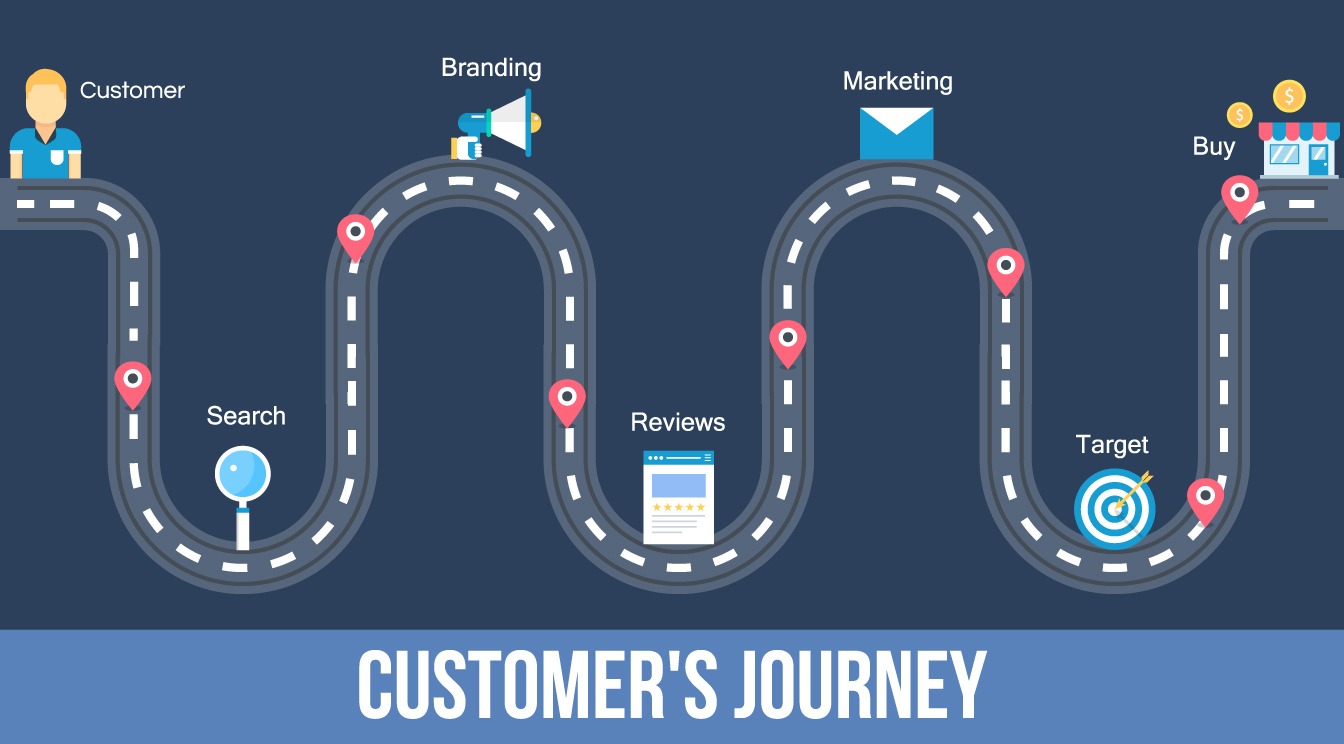
Why SEO and ORM are Important
SEO and ORM are extremely advantageous to any business that wishes to expand its consumer base. ORM can also benefit individuals that wish to protect their online reputation. ORM helps to eliminate any negative information that may be available about them online. Most can handle ORM on their own. However, if you believe your situation is rather complex, contacting online reputation management may be a viable option and can successfully aid in protecting your online reputation.
Oops! We could not locate your form.
How to Remove Mugshots Online
How to Remove Mugshots Online in 2019
Arrested you may have seen your mugshot on Google. Over the past 5 years, there have been about 400 websites created all over the world. Designed specifically to publish public information for anyone to see.
These sites are protected by the Freedom of Information Act (FOIA) which grants them the ability to use public information as they please. As long as they do not threaten you afterward, but sadly this has not been the case. Many statutes have been implemented in efforts to stop the mugshot publication industry but sadly all have failed (read more). Why is that? Well, it is partially due to the fact that most of the websites that publish this information are located outside the confines of the United States People forget that the internet is international.

One statute, for example, has released been past in several states prohibiting the solicitation or paid removal of any arrest information. Many expected the sites to remove all the content for good. But instead, they simply stopped removing information completely. Now many sites will require proof of your dismissal or an expungement. Any legal documents that discredit or prove the posting is misleading or false are grounds for immediate removal.
— M.I.A. Site owners —
The real question is how do you contact these site owners? Where do you send the legal documents? These are all great questions but the truth is some owners will never be found. When a person purchases a website they are granted to ability to pay a little more in order to make their website private. This means nobody really knows who the official owner is.
Here at GuaranteedRemoval.com, our team of SEO strategist has been fighting to uncover the true owners of these websites for the past 5 years. After numerous courtroom battles and many denied requests, we are finally able to remove 99% of all traces of your arrest online. The last 1%, of course, would be the county records if your case has not yet been expunged off your record.
Oops! We could not locate your form.
How Much Does it Really Cost?
Depending on the number of arrests and where they occurred, most of our clients’ removal packages range from $100 to $2,500. For one arrest the average cost is about $1,500 in most states. This solution includes a complete cleaning of your web presence: mugshots, background reports, and negative news articles that may exist online. Next, you must determine the number of arrests and this is where it can start to add up. Many sites will charge more for habitual offenders. Their way of sayings “we hope this teaches you a lesson”.

Some individuals are not concerned with removing everything online about them. Sometimes removing the one or two images on Google, Bing or Yahoo is all you need. Research shows that 90% of Google users DO NOT venture off of the first page. Although if you are job hunting or moving houses it is never a bad idea to start off on a clean slate. These removals range from about $100 to $500 depending on which site(s).
How Long Does it Take?
On average, each removal solution takes about 7-days. From the first time, you call in, until we send your completion letter the estimated timeframe is roughly 5-7 days. Now this will change depending on the number of arrests and the total number of websites that have published your information. Individuals are usually on about 5-10 distinct domains.

Step 1: Content Removal
This is when we will reach out to each site owner of your behalf to request the removal of your information (completed in 72-hours for fast results).
FIND OUT WHAT SITES YOU ARE ON HERE!
Step 2: Deindex Listings
Next, we must inform every search engine that they must recrawl (or update) their results to reflect this change. Furthermore, this is the longest part because the removal is now “out of our hands”. Once those dead pages are sent to Google it is time to relax and watch the images fall offline. As a client please remember once the content (i.e. mugshot or booking information) is removed there is not much more to do. Deindexing is a courtesy we provide. We do this to ensure our solution works and so that individuals will never have to deal with their arrest again.
How Do I Know My Mugshot Will Not Reappear?
What happens if it reappears? How can I be sure GuaranteedRemoval.com can handle this?
Simple. We offer a 100% money-back guarantee. Republications are covered at no additional charge. Once a new arrest occurs, we would, unfortunately, have to handle that as a separate incident. We o not take on cases we know we cannot finish.
After all, GuaranteedRemoval.com offers a FREE ANALYSIS available to anyone that calls, 833-873-0360. In any event, one of our reputation specialists will set you up on a payment plan if necessary. We are here to help, what do you have to lose?
Oops! We could not locate your form.
Business Reputation Management – Why You Need It
When you’re running a business, your reputation in the market is only as good as what your stakeholders (employees, customers, strategic partners, and suppliers) have to say about you. You could be spending a good chunk of your company budget on turning your business into a recognized brand, but one angry customer or employee can make all your efforts dissipate within minutes.
Information Spreads Quickly Online | Act Now
It takes virtually no time to damage your business’s reputation. Things, however, can be different if you have someone working on monitoring the reputation of your business online – someone that takes business reputation management seriously. Most companies use professional reputation management agencies instead of having an expensive in-house team.
The main job of these reputation management teams is to help you reduce any negative attention your brand attracts even if a single “bad” response goes viral.

In most cases, reputation management involves the following two courses of action:
- Removal of the remark in case it is abusive, rude, or constitutes for a legal problem
- Helping businesses coordinate a professional response to such claims and remarks
The idea is to solve the underlying issues, if any, in an attempt to make up for an unfortunate experience a stakeholder has with the company. Most of these efforts are focused on establishing and improving the relationship between a business and its customers.
Oops! We could not locate your form.
Now the question is: why business reputation management is so important for you and your business? Let’s explore the reasons for that:
Trust and Credibility Matters
People love sharing their experiences with certain products and services with their friends and family. They even post reviews on the internet. If these people are your customers, it is important for your business that they trust you and what you offer.
You want people talking about you, but in a positive context. Obviously, anything negative is bad for your business.
Because Your Future Sales Depend On It
Damage control is real. You have a couple of customers badmouthing about your business and the next thing you notice is that you start losing customers and experience an abrupt decline in sales.
However, if you can manage to do what’s necessary to change the opinions of unhappy customers saying all the wrong things about your business, it’s highly likely that the same people will change the negative picture they painted about you online.
Because You’ve Got to Maintain the Company Image
When a third party considers your business for any professional purpose, i.e., joint partnerships or mergers, your business reputation is one factor that prevents them from moving forward.
If a candidate is evaluating your business, either a possible employee or a bank, they will check your reputation. A simple search of your business’s name on Google will tell them a lot about you. If it’s positive, they will consider you a good choice. If not, you could lose many business opportunities.
For these basic reasons and more, it is imperative for modern-day businesses to pay attention to reputation management. It could be a decisive factor that helps you beat your competitors!
If your business is ready for reputation management, contact us today.
Oops! We could not locate your form.











